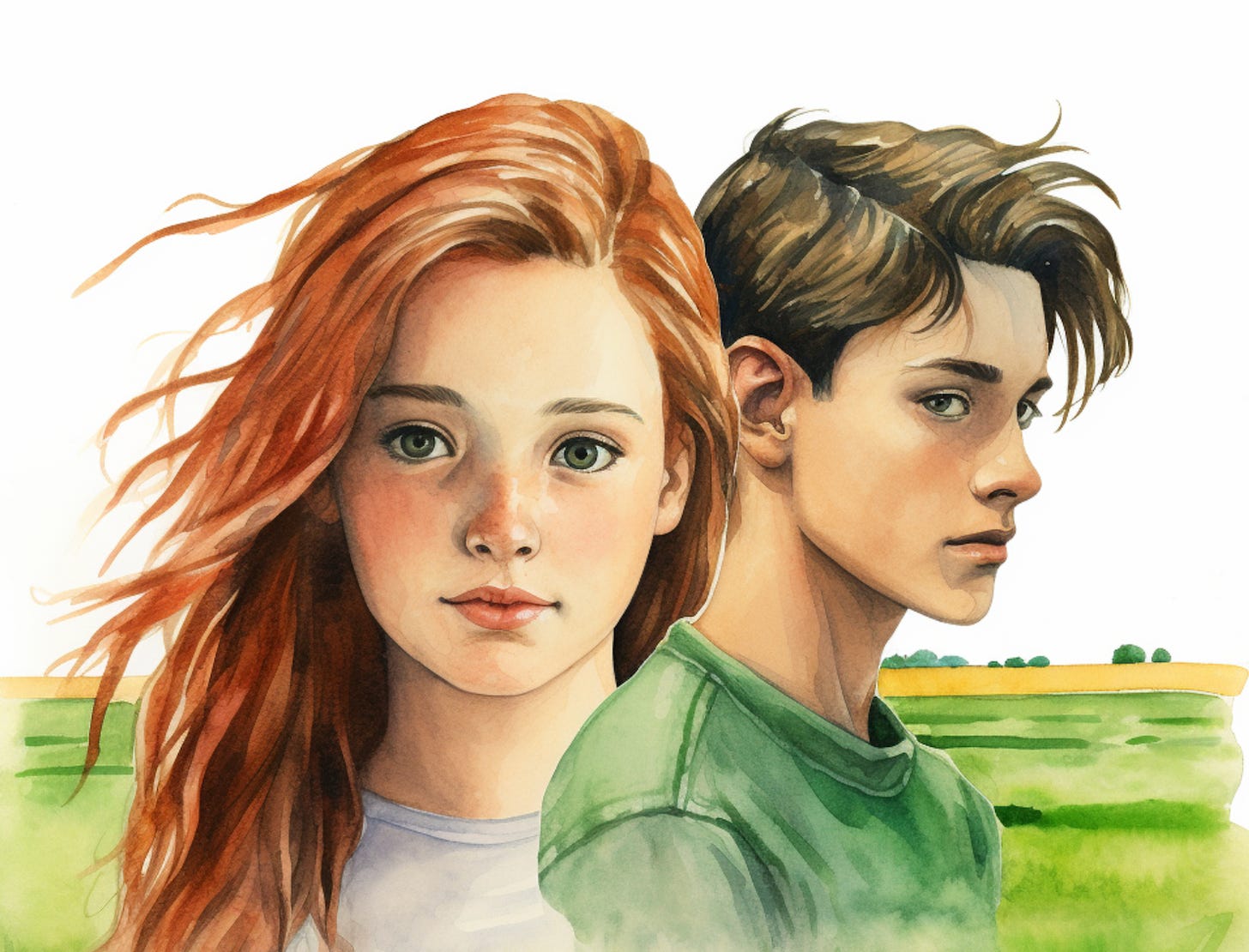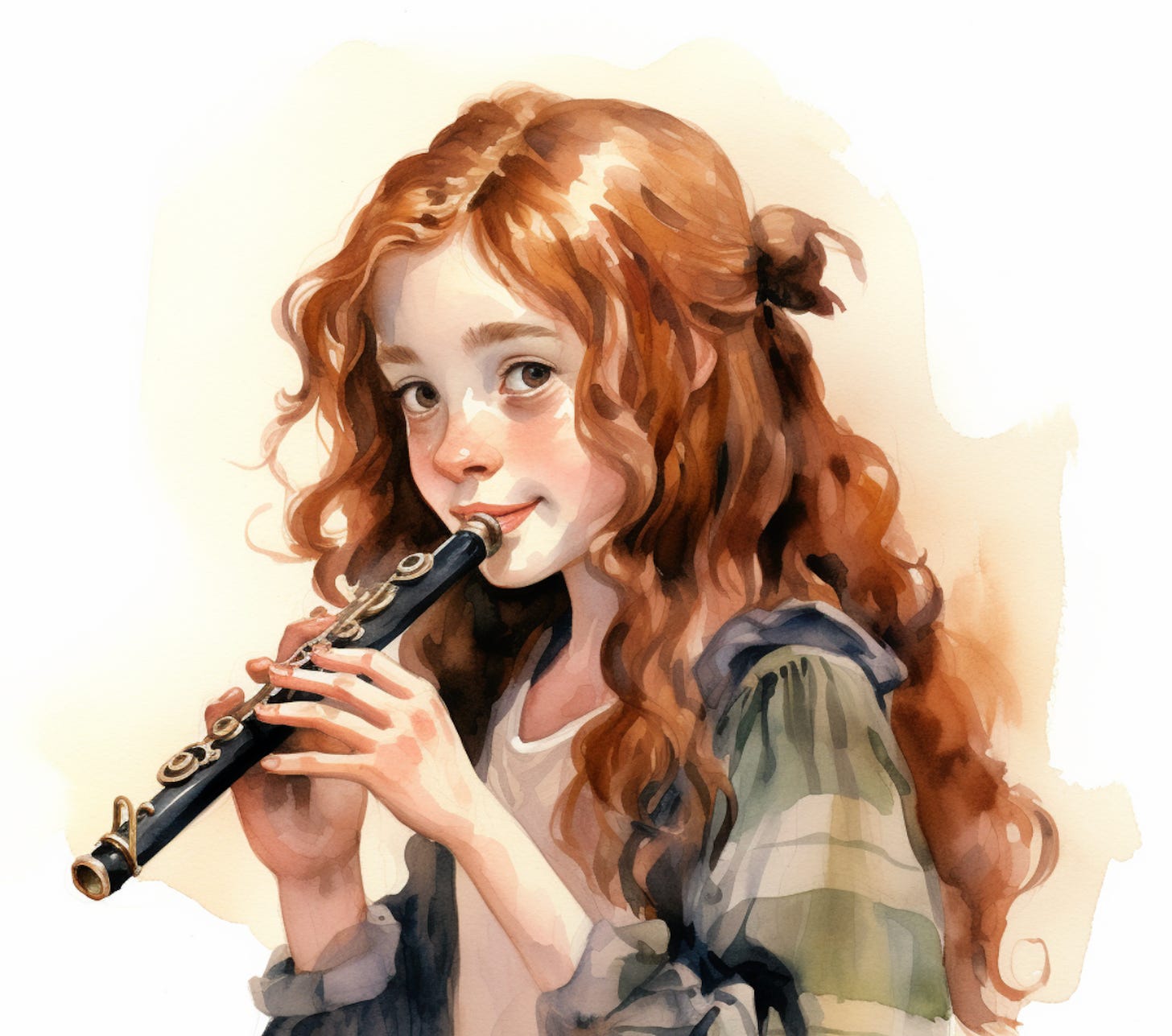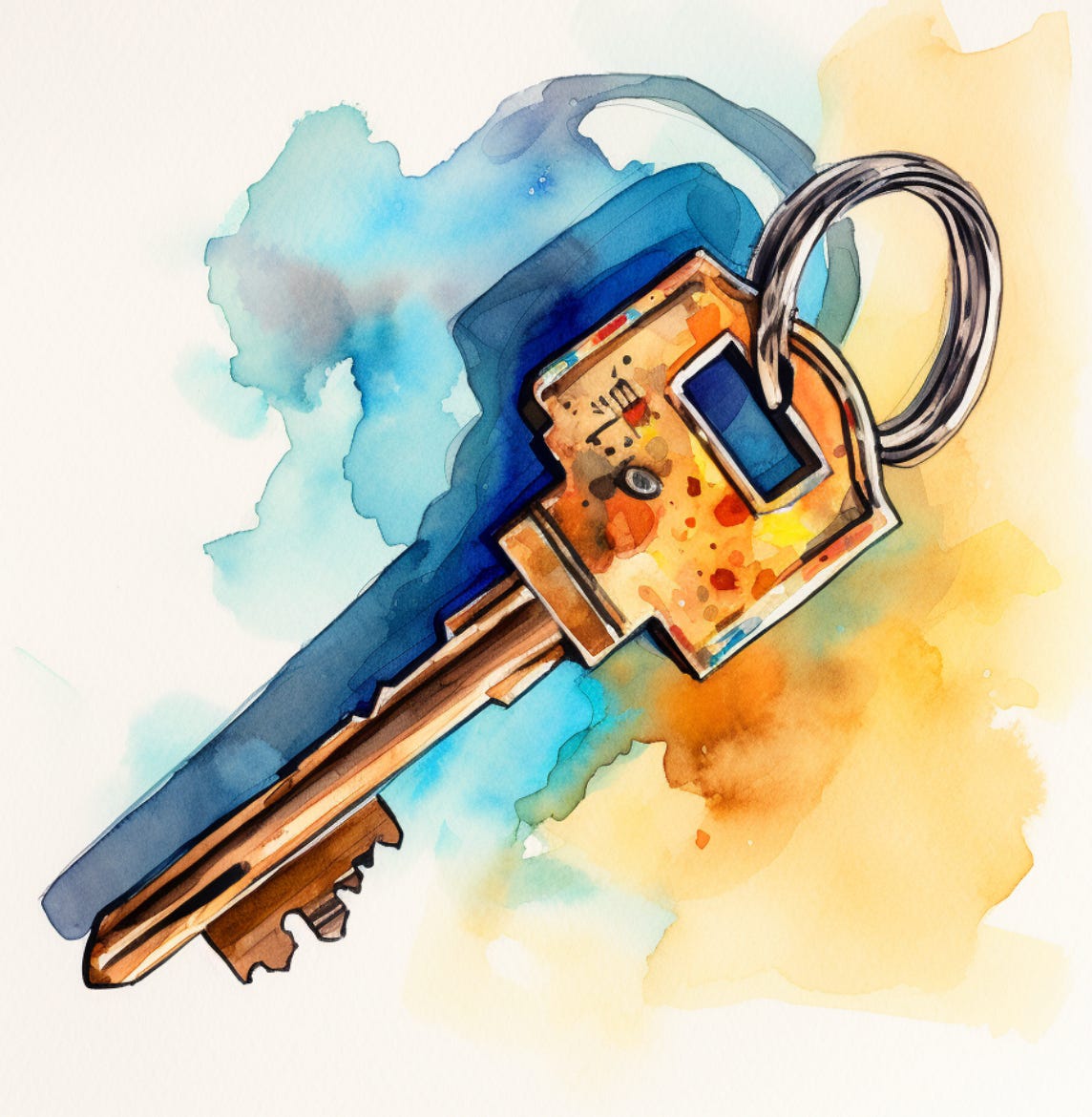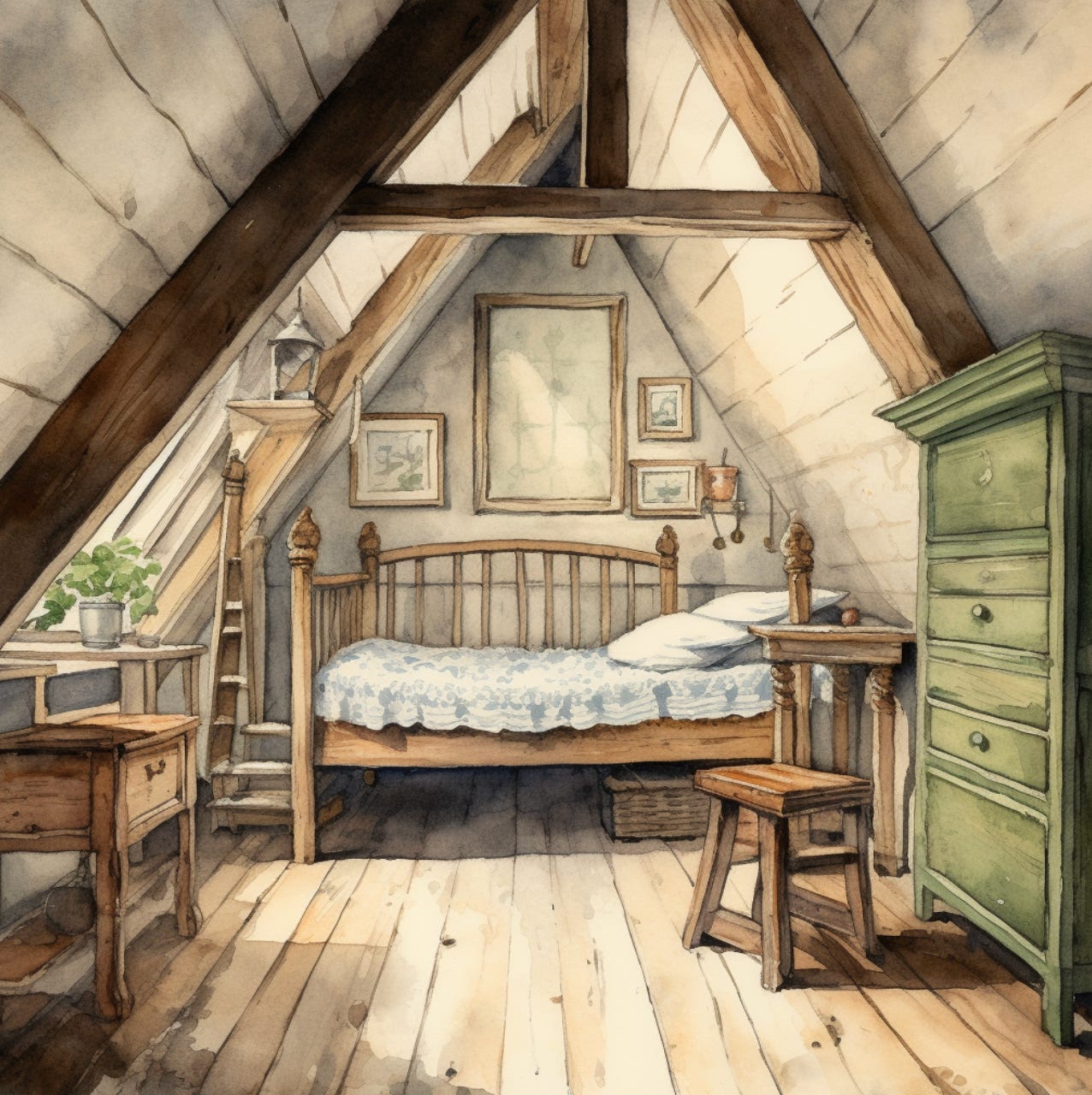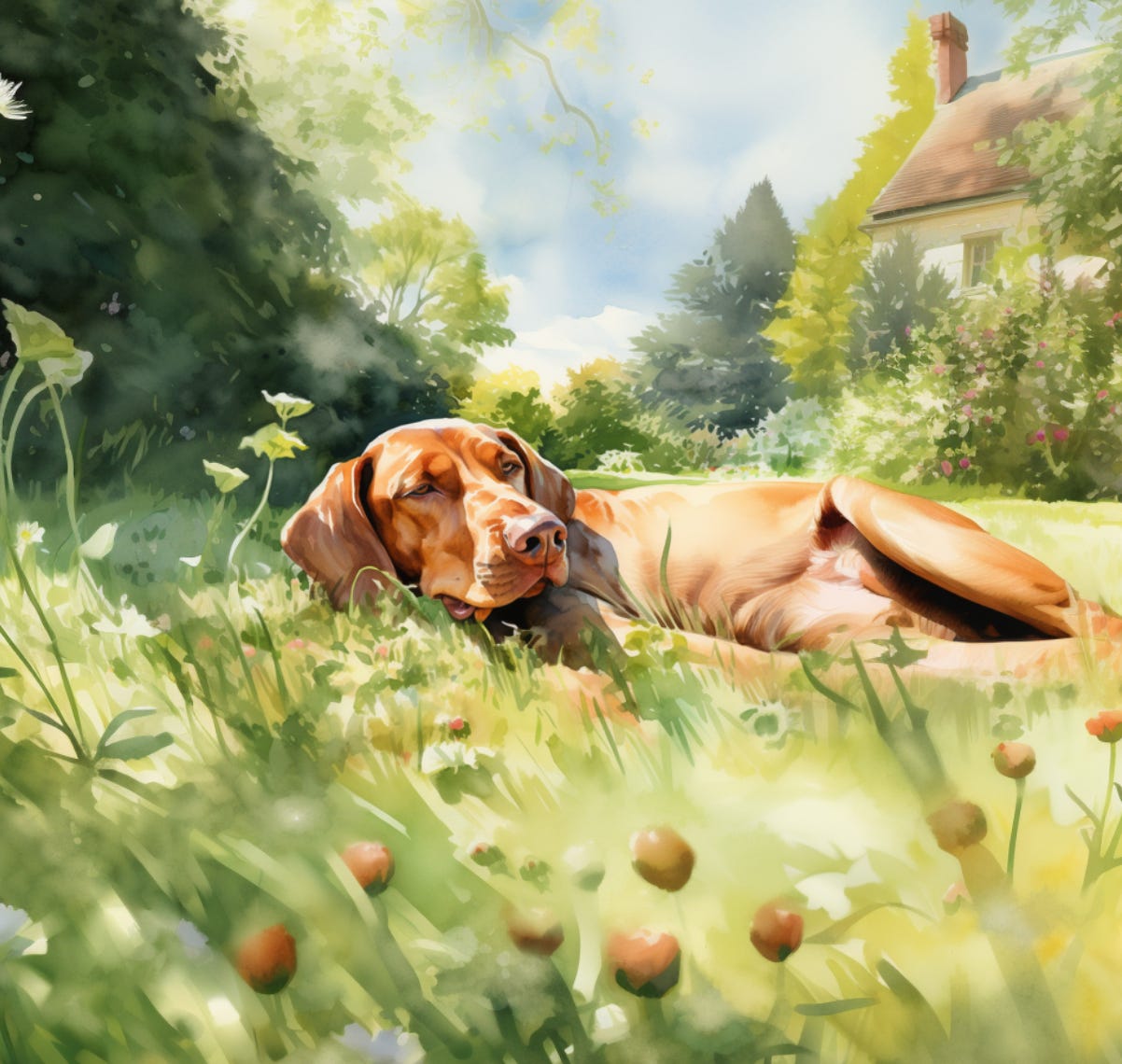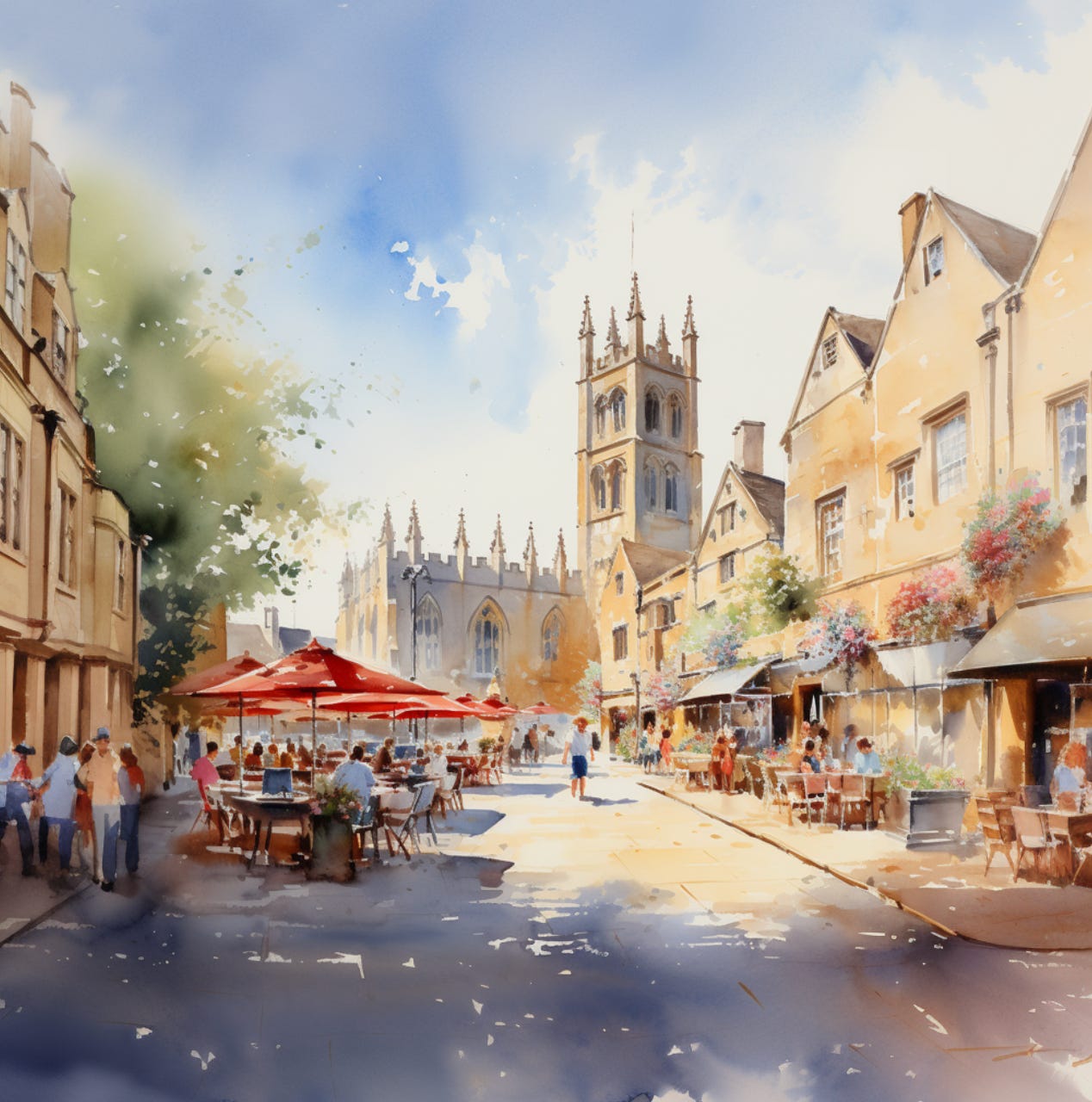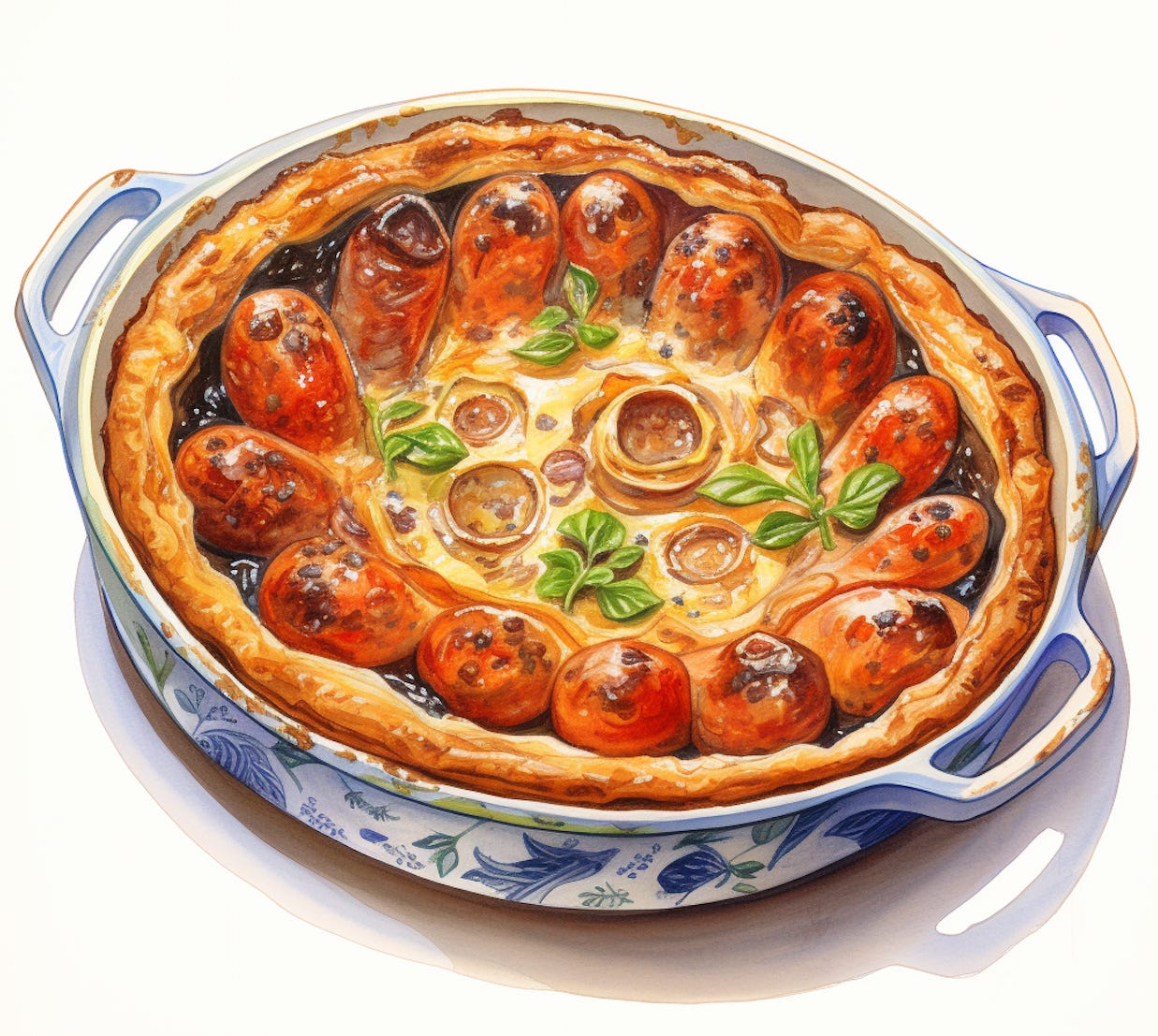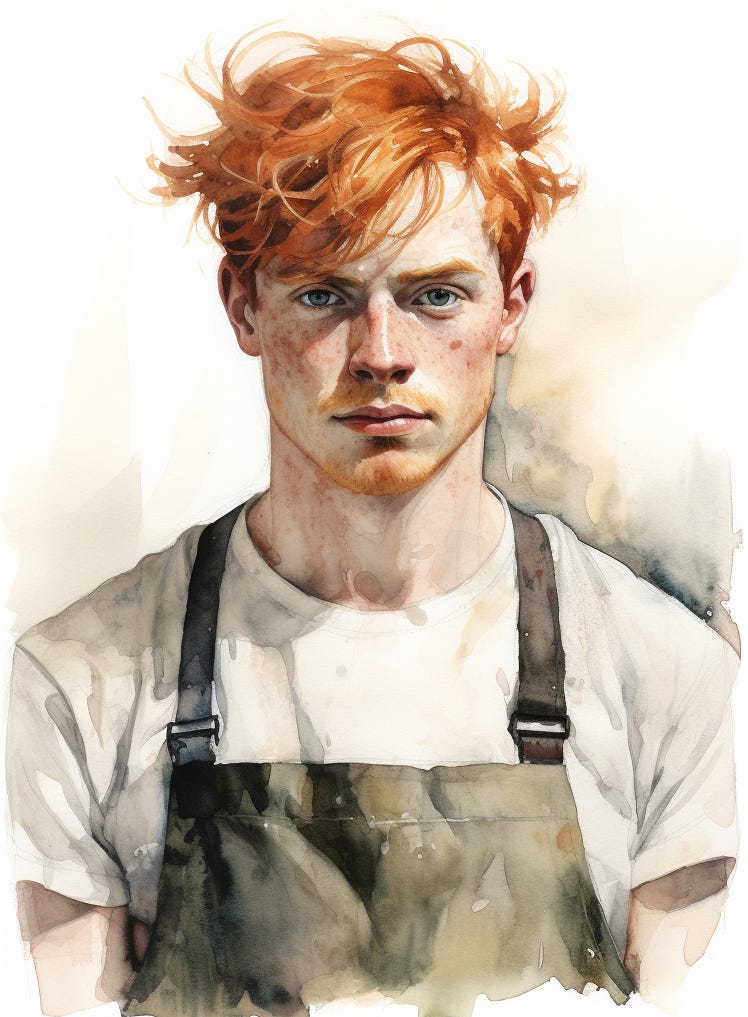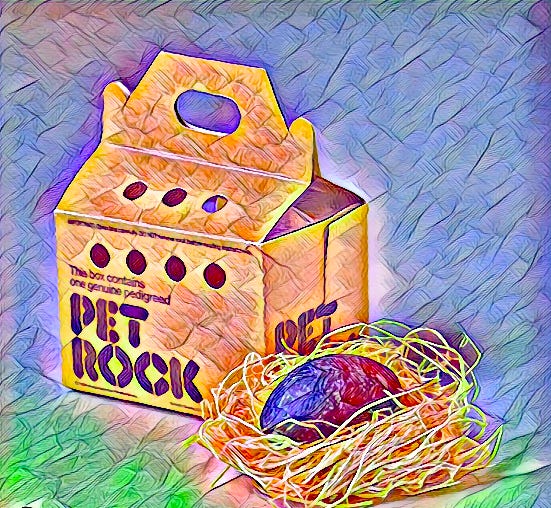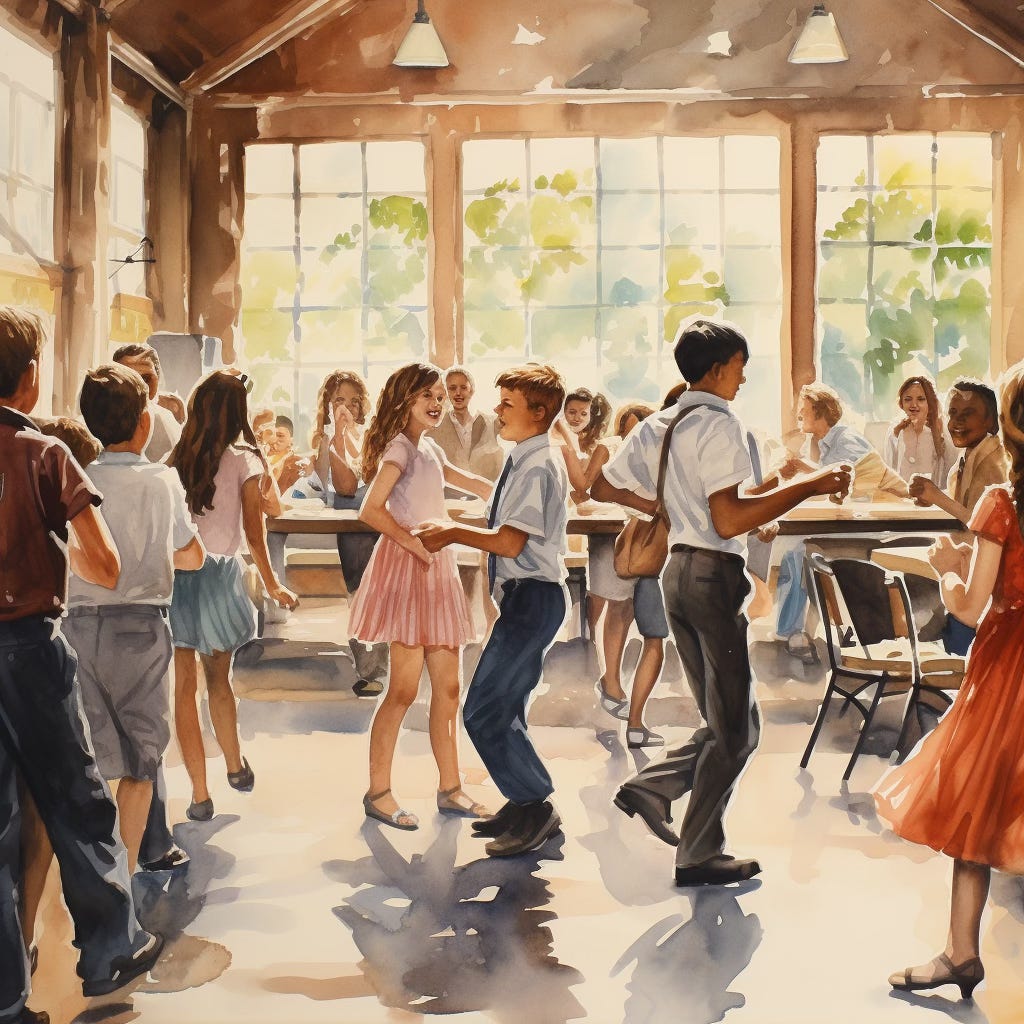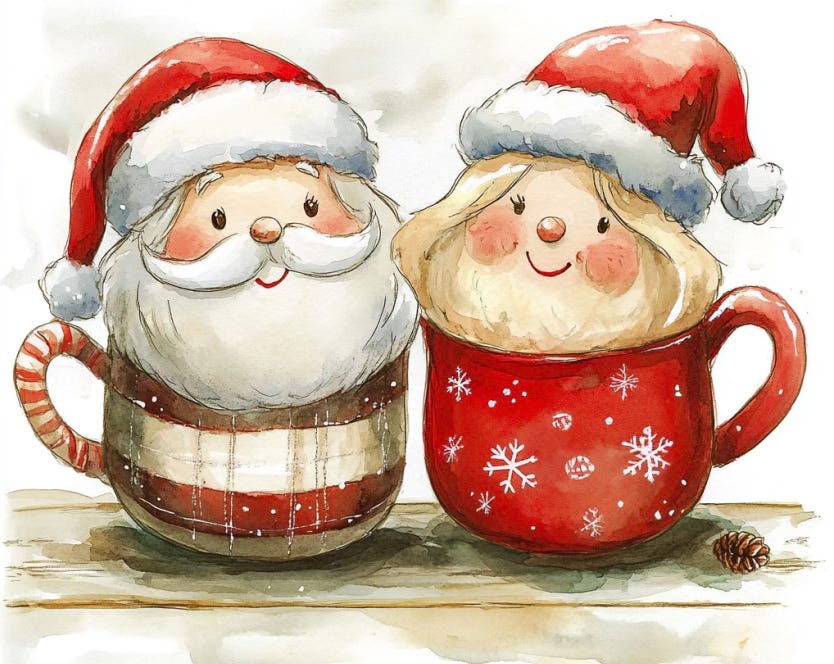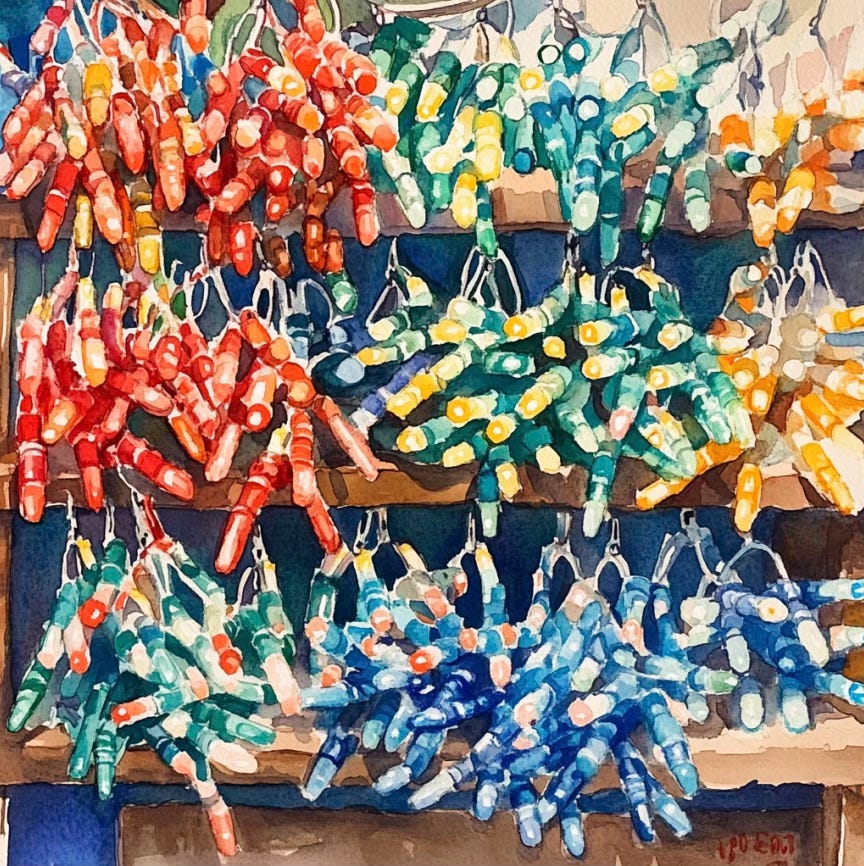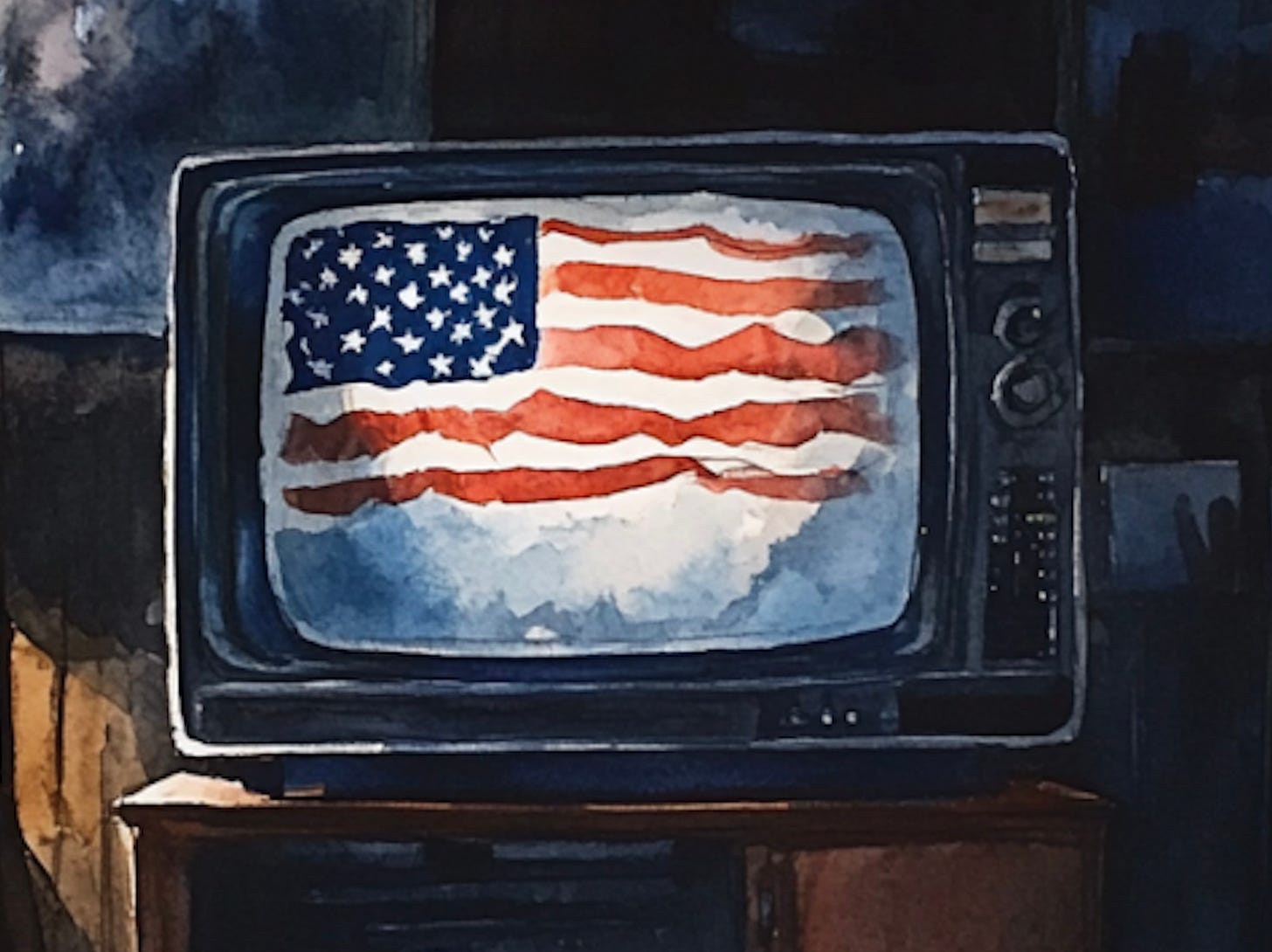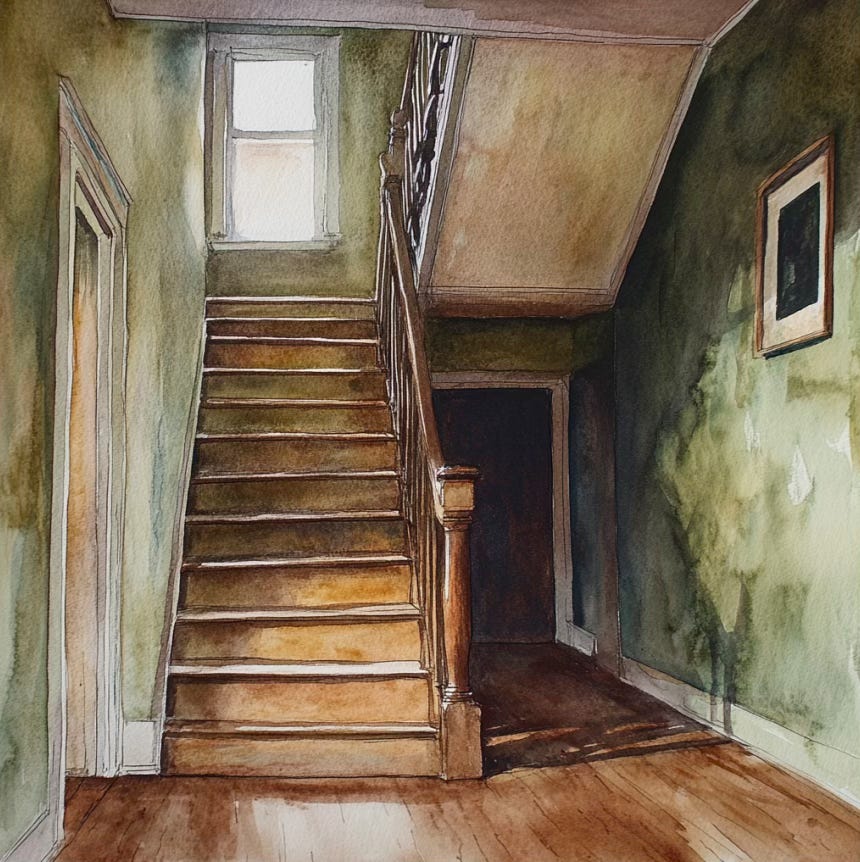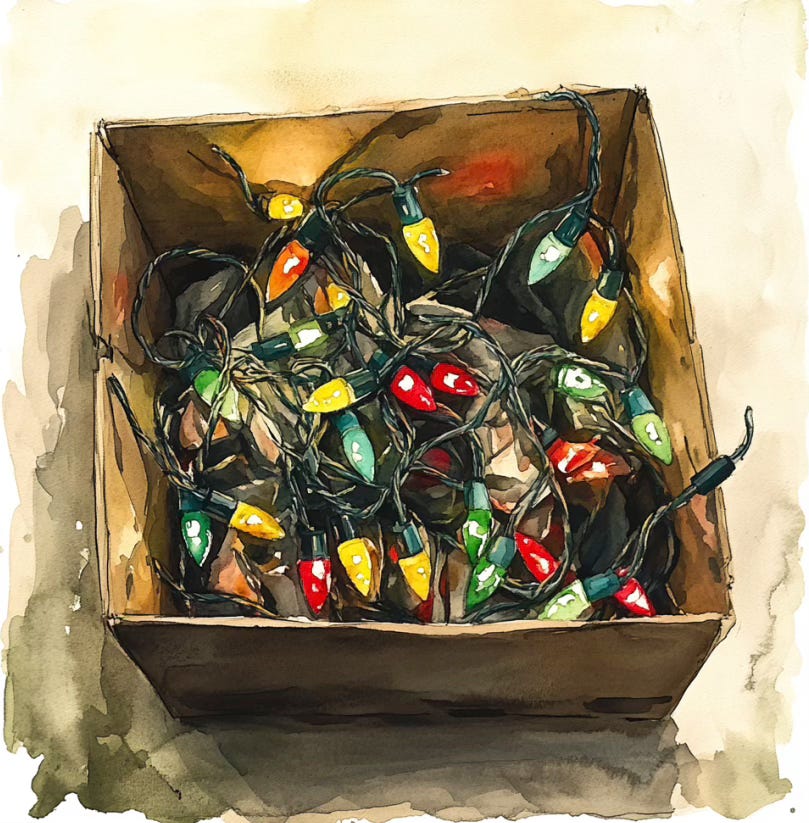The Summer We Said Goodbye
Aris wasn’t much for losing. Neither was I. We set our sights and charted our course, no matter the forecast. Life was like that back then, full of expectations, with imminent destinations always on the horizon. We were eighteen years old, and the Windy Arms was yet another one of our victories.
I
Somewhere west of London, the car jerked, startling me from my slumber. A second downshift knocked Aris' sleeping head off my shoulder. Up ahead, a sign pointing right read, "Windy Hollow."
Another downshift and we took the turn, plunging through a tall thicket onto a narrow lane barely wide enough for two vehicles abreast. Our driver accelerated, tacking from one blind curve to the next with a fool's recklessness.
Or was it a sage's calm? I couldn’t be sure. It was the first of many contradictions to ambush me that summer. I braced for impact, but we emerged intact from the tangled wood into the expanse of a new country.
The English Cotswolds rolled before us, a vast green ocean. A heavy mist hugged the ground, pierced here and there by errant sunbeams slicing through a flat white sky. We wound with the road, up, down, and around, careening like a small sailboat slipping across the surface.
I caught the first glimpse of a town from one of the higher crests, a church belfry poking through a thickening fog. The four points of its tower floated majestically above the gloom one moment, sinking out of sight in a dash the next.
Aris started awake -- she'd seen it, too.
We drove on, the town flickering in and out of view like a looping fragment of film. The silence was palpable. We were in that peculiar, in-between space where, fleetingly, one holds a receding here in one hand while simultaneously reaching across to an unknown now with the other. I kept my eyes trained in the town's direction, struggling to reconcile what I’d imagined with the reality at hand.
It had been my idea to spend the summer working abroad. A flier in my university's career center for international student work permits caught my attention, and I immediately thought of Aris.
Every summer worth remembering, I'd spent with her, the first when we were twelve. That was the year my father transferred to New York, and my mother announced we weren't moving with him. It took weeks for them to come clean with me. By the time I realized what was happening, my dad was long gone.
My mom enrolled me in tennis camp and sailing lessons to make up for it. But her pity only elicited snickers from my older siblings, who were all grown and out of the house long before I reached puberty.
They decided I had it too easy. A summer cleaning gutters and mowing lawns was more in keeping with our clan's modus operandi, notwithstanding the sudden brokenness of our home.
I felt like an imposter waiting for the camp van that first June morning, wearing hand-me-down tennis whites gripping a battered racket that had seen better days. "These will do," my mother proclaimed as she fished them from the recesses of our attic with a bravado that declared nothing had changed.
I had spent hours in that attic as a kid excavating the artifacts of my siblings' childhoods. The Teddy bears, homemade Halloween costumes, stacks of 45s, and Playboys hidden by my brothers under piles of National Geographics were a record of a history that, while not my own, felt like my inheritance.
But my dad's abrupt departure changed all that. It ruptured faultlines obvious to them but not yet discernable to me and unleashed a torrent of accusations about his past infidelities that pre-dated my arrival on the planet.
"About time."
"It's for the best."
"You'll be fine," they insisted.
My dad was a cad, end of story.
Although it provided sorely needed context for the current upheaval, it also called into question the reason for my being. Had I been some kind of reset or last-ditch effort who failed in his mission to keep the family together?
I didn't feel like a failure. But with my dad gone, I didn't feel like I belonged anymore, either, not in the tacit way I had.
My mother's happiness had always been my top priority. But I was also very much my father's son. He's the one who named me "Cosmo,” after all. "Cosmo from the cosmos," he'd exclaim! "Your father, the dreamer," my mom would retort, tousling my hair.
It was confusing. I knew nothing of these paternalistic transgressions my siblings preached. As far as I was concerned, they happened a lifetime ago, yet my world was the one that was now irrevocably altered by them.
It didn't help that every attempt I made to discuss the matter was side-stepped: gruffly by my father, "Don't believe everything you hear, Cosmo;" vaguely by my mother, "This has nothing to do with you, honey."
Be careful what you wish for; nature abhors a vacuum.
In the absence of any meaningful dialogue, my parents’ deferrals were just the push I needed. I was twelve years old and ripe for rebellion. I ceased believing my siblings, courtesy of my father. And I concurred with my mother; this did have nothing to do with me.
And so, with no history of my own and a squandered inheritance, I scrambled into the camp van that thick June morning, destined for parts unknown.
I suppose anything could have happened during that summer of my discontent. It had been over a month since my father left town, and still, there'd been no talk of separation or divorce. I was embarrassed. Since I didn't know what was going on, I didn't know what to tell my friends. So I didn't tell them anything. If my parents were allowed to pretend nothing had happened, wasn't I?
The houses on my street seemed oddly indifferent to my predicament. I was the first pickup that morning and had the back of the van all to myself, giving me time to stake out my turf and cop an attitude, all-around aloofness spiked with a healthy dose of defiance.
The leafy avenues of my neighborhood rushed by anonymously. I stared blankly at the children gathered for the elementary school's annual day camp. I was only a few years removed from that camp yet felt wholly detached from it. It had been one in a series of rites that had pointed me to my future. But my parents’ split had severed the continuity.
The van banked left and headed towards the lake.
If my parents wouldn't talk to me, and I couldn’t talk to my friends, where did that leave me?
The van swung into a driveway and came to a halting stop. The side door swooshed open with a flourish.
"Cosmo from the cosmos," shrieked Aris!
Technically, Aris was not a friend. She had moved to town the year before but had yet to infiltrate the social stratum of our school. Something about her didn't make for an obvious fit. She was pretty but had a moxie that made her difficult to read for kids her own age, like in band class, where I knew her best.
I played the trumpet because that's what my brothers played before me, and a brass horn was already in the family. Aris chose the oboe, a refined version of the clarinet.
The trumpet is obvious; just press your lips together and blow. But the oboe is a different story entirely. It requires a disciplined contraction of the facial muscles and a controlled aperture of the lips to coax any kind of sound from the pipe, let alone one you’d want to hear — the "embouchure," as it's called.
Our fussy music teacher, Mr. Otis, just loved that word, ahm-boo-sher. He'd ferret each of its syllables out at every opportunity, bastardizing its French sexiness with his Midwestern twang.
"No, no, no, Luana!" he'd bark, tapping his baton on the music stand in front of him. "Your aim-bow-share is off, way off — sloppy, sloppy, sloppy. Are you practicing at home? You must, must, must — every morning and every night! Cheeks taut, lips parted, teeth set. That's your aim-bow-share."
Aris proved no better at prosecuting her embouchure than the other oboists at first. But unlike the rest, she made no bones and didn't shirk.
"Maestro," she'd interrupt.
She had a habit of calling him "Maestro," which would have earned her our collective contempt if not for the way it stopped him dead in his tracks.
"Yes, Aris?"
"Yesterday, you instructed us to keep our jaws relaxed, but just now, you said to set our teeth. Is it possible to do both at the same time?"
"Quite right, indeed...d-did I -- ?"
It would have been easy to mistake Aris' formality and penchant for detail for brown-nosing, as some of our classmates invariably did. But she was so utterly unselfconscious about it that for anyone paying attention, it was impossible to find fault with her. She was, after all, making a statement of fact. Mr. Otis was our instructor and conductor. "Maestro" was spot on.
She didn't overplay it, either, pulling it out only for consequential matters, like when Mr. Otis ran off at the mouth. He loved to hear himself talk and frequently contradicted himself from one session to the next. Band class was often pulled under by his blustery theatrics. But Aris had a knack for cutting through his hubris by appealing to his vanity with nary a hint of impudence.
And she backed it up with an indefatigable verve, doggedly blasting through all manner of squeaks, screeches, and squawks no matter how red-faced and teary-eyed from hypoxia she became. We could only watch wide-eyed and slack-jawed, caught somewhere between embarrassment and awe.
Eventually, Aris’ squawks became less screechy, and her squeaks more melodious. She had done it right there in front of us all. In raising her own game so unapologetically, she raised the rest of ours, too, the Maestro's especially.
"Best one yet!" my parents called out to a beaming Mr. Otis after one of our recitals. They meant it, too, I’m sure.
That's when Aris probably picked up on my dad's tagline for me. He was a happy-go-lucky guy who enjoyed instigating public displays, like at school performances over the din as the curtain rose or afterward during the applause.
"Cosmo from the cosmos!”
I'd be lying if I said it didn't make my heart skip, especially when my mom followed with her rejoinder, "Your father, the dreamer."
She had too much discretion to say her part out loud in social settings, but I'd hear her nonetheless, if only in my head. It was like an inside joke only the three of us shared, and it always made me smile.
I hadn't been smiling much lately, though. So hearing those words ring out on a strange driveway that first morning of tennis camp totally ambushed me. Aris stopped me dead in my tracks as she had so many times before with the Maestro. Her rendition of my dad’s catchphrase for me was like a clarion call that tapped something deep within me.
Cosmo from the cosmos!
Too cool for school didn't stand a chance, and I shot her my toothiest grin.
Spending the summer working abroad may have been my idea, but the Windy Arms was all Aris’ doing.
Her father had gone to law school with its owner, a lord or gentleman of some sort, who lived nearby in the region and arranged for us to join the small inn’s staff for the summer. I was just happy for the job and jumped at the chance to travel overseas for the first time while saving some money for my second year of college. That was a non-negotiable with my mother, and once I had her assent, I didn’t ask any more questions.
This wasn’t going to be just another one of our childhood adventures, though. We had a year of college under our belts at campuses geographically and culturally far apart. I had gone west to get as far away from the gravitational pull of my older siblings as possible. Aris was an only child who had gone east, following in her parents’ footsteps, both successful professionals.
Aris had a plan; I had ideas. The doer and the dreamer. It’s what made us work as well as we did together.
But the impending stakes of adulthood had begun to assert themselves. Academic majors would soon need to be declared, with ramifications lasting far longer than a mere summer or two.
“Decide,” which shares the same Latin root as “homicide,” literally means “to kill off.” And that’s what it felt like I would be doing to my future, killing it off. I had my siblings to thank for it.
After some rough patches in their own lives, they had each settled down and were at various stages of marriage and having kids. There were six of them, and none seemed entirely happy about it.
My eldest sister had scandalized the family, eloping with a truck driver she met while cocktail waitressing after dropping out of college. Her husband, my brother-in-law, had already bankrupted his trucking business twice, and my dad had to bail him out, not that we had that kind of money.
My second sister, conversely, had married her high school sweetheart. He joined his family’s successful accounting firm right out of college, and they were married with kids in no time. Picture perfect, except he was fond of the bottle and was an angry and unpredictable drunk.
Next up was my eldest brother. He’d drawn a low draft number during Vietnam and signed up for the Marines when I was still a toddler. He survived the war but had been AWOL from the family for years. Things had taken a bad turn when my father remarried within weeks of the divorce and expected all the kids to schlep to New York for the nuptials. My mother went mental, and my brother couldn’t handle it, ceasing all contact with the rest of us.
The real casualties of my family’s demise were the next three, another brother and two sisters, grouped in a tight clique after a small gap in my parents’ procreative efforts. If the first three were of a Leave It to Beaver mindset, these three were all Kerouac, having grown up in the late 60s. They were the ones who had borne the real-time brunt of our dad’s philandering.
A warren of rooms on the top floor of our house had been their domain, which is where the attic was. I used to love making covert excursions up there whenever the coast was clear. I’d discover all kinds of treasure on forays deep into closets and crawl spaces, like the sculpture of water and colored glass I found on one such mission. I had no idea what it was for, but it was fascinating to look at, even if it did smell funny. So I swiped it. I’ll never forget the look on Miss Pelly’s face when I planted my brother’s bong squarely on her desk for “Show & Tell.” Needless to say, I was banned from the upstairs moving forward.
In no time, though, they were all gone, off to college and out of the house, my dad included. Just like that, the chaos that had been my birthright cleared. And it was just my mom and me bumbling around in an oversized domicile that was, as she was fond of complaining, “too big to heat.”
Even at my age, I could have told you she'd never date, let alone marry again, and not just because we were Catholic. Underneath her “jilted for another woman” narrative, I think she was relieved.
My mom was a smart woman who had graduated from high school with honors at sixteen. At a time when most women were getting married and having kids, she continued her education, earning a Bachelor’s in business and enjoying a short stint in corporate America before succumbing to the times and settling down with my father, a traveling watch and jewelry salesman.
The dissolution of her marriage had been her worst nightmare. But it had also effectively given her a new lease on life.
It seems significant, especially in retrospect, that my mom and I were now the only single people in our family. And we quickly fell into a rhythm with rituals that were ours alone.
If there was one thing I’d been conditioned for my entire life, it was adaptability. I’d grown accustomed to being left behind when the party moves on. So it was no great shake to me when my mom pursued interests outside the home, part-time work, at first, and then full-time enrollment in a Master’s program.
The transformation of my family was complete. I was now a key-carrying member of the fastest-growing demographic of the 1970s, a latchkey kid.
Aris was a latchkey kid, too. It was all she’d ever known.
“A real self-starter, that one,” my mom would needle me. And she was.
Aris would tackle initiatives I didn’t have a clue about starting. She’d have a well-balanced, three-course meal perfectly timed with her parents’ arrival home at the end of a long day and frequently recruited me for afterschool runs to the local butcher or baker to pick up items for that evening’s feast — brisket or salmon filets, babkas or rugelach — all Kosher, of course.
Aris’ parents were cultural Jews. But sometime during her primary years, Aris declared otherwise, and they started keeping Kosher and attending weekly temple.
It was an entirely Aris way of being, like with the oboe, all or nothing. And her parents were only too happy to indulge their little prodigy.
My siblings took to calling our budding friendship “Cosmo’s cultural exchange program.” Even Aris’ mother quipped I was becoming Jewish by osmosis.
They weren’t wrong. There was something. It just didn’t have anything to do with religion.
For me, it tracked back to that first morning of tennis camp after my dad moved out. I was in a tight spot that day. There was no guarantee I’d keep my head in the game. And it was a game. I knew because I had been witnessing my brothers and sisters play it with varying degrees of success, the beguiling Horatio Alger Myth.
Education was its linchpin, something my mother knew all too well, having grown up in a blue-collar, devoutly Catholic household during the Great Depression. It’s what made our affluent, predominantly Jewish suburb both a blessing and a curse for her: a blessing for its top-notch public schools, a curse because keeping up with the “Steins” proved frustrating if not futile.
From amiable altar boy to algebra ace, I knew what was expected and aimed to deliver — until my dad dropped out, taking the floor with him.
Cosmo from the cosmos…
Aris hadn't so much co-opted his moniker for me as usurped it, turning it from the barker’s pitch it had been to a decree so unflinching that I went from sidekick to hero in one fell swoop.
The tent flaps parted, and the sun streamed in. Fresh eyes revealed a landscape of untamed potential.
Those eyes belonged to Aris.
II
Like many hamlets lodged throughout the Cotswolds, Windy Hollow’s name has an exacting historical origin, a fact I found fascinating given the Tolkien flavor of the region.
Bourton-on-the-Water, for instance, is not, as a Yank like me might have deduced, a drink at the local pub, but rather "Burh" (Olde Saxon for fortified camp) plus "ton" (a village), with a river running through it for good measure.
"Stow" (a meeting place, often for worship) and "wold" (high rolling fields) yield Stow-on-the-Wold.
And my favorite, Castle Combe, which is literally a castle in a small valley.
Ergo, the Cotswolds, or small sheep enclosures (“cots”), spread across rolling fields, which explained the wooly flocks speckling the distant hills like dirty whitecaps.
So it made a certain sense when the dilapidated sedan transporting us sank into a slender trench and tunneled forward at root level.
A holloway, or “hola weg,” is a path carved into the earth over centuries by foot and hoof traffic. Some date as far back as the Iron Age. And many are still in use today.
There was a primal, forgotten feel to its shadowed walls of earth and green that evoked storybook adventures with hobbits and Druids and reminded me of the ravines along Lake Michigan where Aris and I grew up. Even the wind picked up a bit as we drove deeper into the shoot, gusting us along the ancient thoroughfare to our final destination.
We were right there, on the cusp of it. Both of us could feel it in our bones. Instinctively, we turned to one another as we had so many times in the past at the start of something new and undoubtedly magnificent.
Out we shot from the holloway just as the first drops of rain began to land. Windy Hollow lay before us, its low-slung limestone buildings tucked neatly into the creases of the sloping uplands.
Our driver skidded to a stop on the High Street and deposited us with our luggage onto the cobblestones before rattling away into the rain.
Alone, the moment could have been terrifying. With Aris, it was exhilarating.
Except for a crest on the front door, the Windy Arms looked like any other building in Windy Hollow, a soggy stone structure of ancient origin. Aris checked the nameplate to make sure it was the right place. It was, which was a good thing since the rain was now coming down in sheets. We hustled inside with our bags and pushed through to an anteroom, doubling as a small lobby.
A brass bell sat on a desk with a “Ring me” sign next to it. So, Aris did.
Outside, thunder boomed, and lightning flashed.
We were about to give the bell another try when the sound of glass shattering stopped us.
“Oh, no, Tammy! Not the whole lot — ”
“Don’t look at me. She didn’t hand it off proper.”
We tracked the commotion down a corridor where we found our new colleagues ferrying up flood-soaked cases of wine from a root cellar in a sloppy free-for-all.
The cause of the ruckus lay in the middle of the floor, a heap of wet cardboard and broken glass oozing a puddle of thick red goo.
No sooner had I rounded the corner than I hit the slick, my feet shooting out from under me.
“Whoa, whoa, whoa, boyo, steady on — !”
A chap around my age caught me by the waist as the rest of the crew looked up, consternation flashing across their mud-splattered brows.
Headlong into the void stepped Aris, extending her hand with aplomb.
“Hi, I’m Aris, and you just saved Cosmo’s ass.”
Aris had a habit of laughing at her own jokes, a high-pitched staccato number that was either remarkably self-confident or annoyingly self-important, depending upon who was listening.
The group stared back, giving us the once-over — Aris’ loafers and pearls, my flip-flops and California tan.
There were three of them, not counting the chap at my back: a young girl and two other lasses around our age.
“We got guests!” the young girl hollered into the cellar.
Aris laughed again. “Oh, no, we’re not guests. We’re Aris and Cosmo.”
Daft silence followed by frantic whispering punctuated by a very audible, “Ah, yes, the Yanks!”
Out from the cellar scrambled Vic, the Windy Arms’ innkeeper, followed by Matty, his deputy, a middle-aged woman with a scowl.
“Right O, Aris. Cheerio, welcome! How was your flight? Safe journey, I trust?” Vic shook Aris’ hand effusively.
“Wonderful, thank you.”
“And Timothy, fetched you from the airport straightaway?”
“He was perfect.”
“Brilliant! And this must be — ?”
“THIS is Cosmo,” Aris announced, stressing the “this” a little too hard.
“Yes, of course, ‘Cosmo,’” he bowed his head apologetically and repeated my name as if lodging it in his brain. “C…o…s…m…o...”
The chap at my back still had me by a belt loop and dutifully released me, sending me sliding through the goo all over again.
“Looks like CAHSMO needs some Wellies,” quipped the lass closest to the cracked case of wine.
“Tammy — please!” Vic pointed her to a mop in the corner and mimed swabbing motions.
“Terrible mess, as you can see. A full fortnight of rain already, ground’s soaked clear through. If we don’t get the bottles up, out, and — Ah, but you must be knackered and famished?”
Aris’ laugh was more of a warble this time and lacked any of the gusto of her earlier deliveries. I could tell she was mulling over Vic’s offer of rest and refreshments by the way she was squinting. I was starving, myself, but the grimy faces of our new workmates staring back at us dictated otherwise.
“We’re happy to join the cleanup effort, Vic.”
“Oh, Cosmo, really, that’s very chivalrous of you, but you must be spent, no?” A slight vocal uptick and furtive glance to take Aris’ temperature gave him away.
“Absolutely, it’s why we’re here,” I insisted. Aris knew not to begrudge me these matters.
“Of course, we’ll pitch in. It’s only obvious,” she relented as gamely as possible.
“Aces!” He clapped his hands in a singular note of glee. “Now, Cosmo, there’s quite a bit of lifting down below. And Aris, do be a love and join the other girls wiping down the lot already up. Save as many labels as you can!”
“Guess I’ll just go grab me some Wellies, then,” I mugged in Tammy’s direction before promptly falling flat on my ass.
Our flight had touched down at Heathrow at dawn putting us into Windy Hollow by mid-morning. It was presently early evening, and Vic was just now showing us to the staff quarters. The three of us trudged in a persistent drizzle to a cottage behind the hotel, loaded down with our luggage.
Just inside the front door was a small bathroom, a “loo,” as Vic called it, or “toilet” because that’s what it was, a room with a toilet.
It was funny to hear Vic call it a toilet. Back home, we have so many other names for it — pot, throne, bowl, porcelain god — that toilet sounds almost dirty. But toilet it was, and I couldn’t argue with that.
Just beyond was a sink with a mirror and a tub in the corner behind a plastic curtain. No head for a shower, though.
Besides the toilet, everything was out in the open, shared by the staff bunking in rooms off a hallway running down the middle. Half-used soaps, toothpastes, and shampoos lined a shelf along the wall.
Vic guided us up a staircase, growing visibly excited as he presented a converted attic.
“Voila!” he said, waving us in.
The eaves sloped up steeply from the edges, and I hit my head climbing the final step.
“My, you are a tall chap,” he mused while furtively guiding a bucket under a ceiling drip with his big toe.
There was a rustic charm to it. Dormer windows on either side provided views of the hotel garden and fields beyond.
But it was just the one room with a solitary bed looming like a stalking elephant. Was it a twin, a queen? It didn't look like a twin, but it wasn’t wide enough for a queen, either. Definitely not a king.
“I reckon you’ll be snug as two bugs.”
“It’s perfect,” gushed Aris. “Thank you for making everything possible, Vic.”
Perfect?
This was unexpected. Did he expect us to sleep together? Did she? Was no one going to mention the elephant?
Apparently not, because Vic headed for the stairs.
“Well, I’ll let you two get to it. Thanks again for pitching in today. Just splendid! Now, you’re both on for lunch and dinner tomorrow. And Matty has Cosmo scheduled for Lates, though we’ll have to look into that. So, say, 11:00 in the pub for a quick run-through? Otherwise, brekkie’s in the kitchen whenever you fancy. But feel free to have a lie-in, it being your first day ‘on the farm’ and all,’' he winked, intoning the last bit with an eye-rolling American Southern accent.
Aris tittered obligatorily. My smile was thin and delayed as I was still processing the sleeping arrangements.
“Cheerio, ciao, y’all come back now and all that!” He prattled on as he made his way down the stairs.
I followed Vic out to grab the last of Aris’ luggage. My lot amounted to a duffle bag and backpack. Her collection littered the floor.
She was already unpacking by the time I got back, so I set her final two bags with the others and surveyed the room.
Other than the bed, the only places to sit were the window wells. I made my way to the one facing the Windy Arms and collapsed.
Aris' luggage was a genuine feat of organizational infrastructure.
One piece was nothing but shoes, a cube split down the middle, each half a tidy honeycomb of pumps, sandals, and flats.
A hatbox lay at my feet. I took turns modeling the enclosed headgear.
“Oh, definitely that one,” she giggled, choosing a floppy straw number with a pink ribbon as her favorite for me.
I fished my clock radio out of my duffle. T-Minus had never failed me, rousing me for pre-dawn swimming practices throughout high school, which had turned into rowing workouts when I joined the college team. So T-Minus went with me everywhere, and I uncoiled his cord with due respect.
“That one, over there,” Aris said, pointing to a small footlocker by the bed.
I lifted its lid to a trove of electrical adaptors and pulled out a female-to-male that matched T-Minus’ American prongs to the wall’s British socket and plugged him in.
“Voila!” I said, imitating Vic.
“BzzzzT,” T-Minus flashed on, brightly at first. Then, “ZAP!”
Sparks shot out from the socket. T-Minus rattled, fizzled, then faded to black.
Aris shook her head. “That’s only an adapter, dummy. You need a voltage converter, too.”
She tossed me a heavy block chocked full of holes of various sizes.
I stared at the smoky wisps scarring the wall around the outlet where T-Minus had just made his final stand. Such an ignominious end for so reliable a friend.
I tore the murderous adapter from him and chucked it in the bucket.
Aris could sense, if not quite understand, my loss and threw me a pillow.
By now, she had the entire elephant shrouded in her wardrobe, so sleep was out of the question. Yet sleep was all I could think of.
I flipped off my shoes and curled into the window well, clutching T-Minus to my chest. The Windy Arms dining room was visible across the way, and I could make out figures moving about in between the raindrops trickling down the panes.
The chap who had saved me earlier was there.
He balanced a large ceramic platter on one outstretched arm while serving with the other.
He’d present the dish to the guests, giving them time to admire its offerings, then deliver their selections using two large serving spoons like chopsticks.
It was a mesmerizing dance as he glided from table to table, not once dropping a morsel.
It was the bluest patch of sky, so bright I had to squint.
Where was I, and why was I hugging my clock radio?
T-Minus. Right! Poor T-Minus.
I’d slept the whole night in the window well, a blanket tucked in around me while Aris snored softly on the bed.
The room was immaculate. She'd found a nook for every one of her items and had even hung my dressier articles up on a rod in the corner. There were only four hangars, but she'd split our things evenly: my blazer and button-downs on two, her dresses and blouses on the other two.
Vic’s voice lofted up from the garden. Two men wearing leather tool belts had just arrived. The three of them disappeared through a backdoor into the Windy Arms.
From the angle of light dappling the fields, I estimated it was still early.
I tossed off the blanket and laid T-Minus to rest in my duffle. Aris had left my more personal effects untouched. And I pulled on shorts and a T and crept down the stairs to lace up my runners.
One step outside the cottage, I was drenched in sunlight. Waves of it poured over every blade and flower: larkspur, hydrangea, iris. It pounded the air and flooded all of Windy Hollow.
A hound sunning himself nearby cocked his head. I must have passed muster because he returned to his sojourn without missing a beat. I sprawled out on the grass next to him for a quick stretch.
Butterflies flitted above my head, and bees buzzed from blossom to blossom. It was glorious.
An arbor draped in Wisteria led to the hotel. I tiptoed under vines ripe with purple and white bouquets. No one was about, and I wanted to savor as much of it on my own as possible.
I skirted the root cellar where Vic had gathered with the workmen and proceeded through a set of swinging doors into a kitchen.
Windy Hollow’s simple facades belie the scope of the labyrinths held within. The Windy Arms kitchen was such a space.
An elderly woman wearing an apron sat at a metal counter sipping tea and eating a biscuit. She waved me to a stool and poured me a cup. I accepted her offer of milk and sugar and joined her in the stillness.
Boxes of cereal, granola, and Muesli lined the wall. She gestured to yogurt behind the refrigerator glass. I demurred, choosing a banana from a bowl instead. She smiled her approval, and I nodded my thanks.
The English countryside was calling. And I was eager to get a good run in before the morning got away from me.
Best I could tell, there were three ways into and out of Windy Hollow: the route we had taken through the holloway, which egressed the village perpendicularly at its midpoint, and two roads connected with the High Street at either end.
I headed left for the more promising vistas and set off at a light jog.
A babbling brook running the length of town cut sharply and intersected the High Street just below the Windy Arms. I vaulted the stone bridge and picked up the pace as the walls of shops gave way to private lodgings, the church, and, finally, the cots and wolds lending the region its name.
It felt good to be out working my legs. I loved the feeling of lightness and invincibility running gave me. It was my time to ponder, to dream.
And what occupied my thoughts this morning was the elephant.
The truth is, I’d developed a bad habit of avoidance dating back to my parents’ divorce. I never had come clean with my friends about it, even after my parents had named it.
My dad actually skipped over that part, showing up one day unannounced with his new fiancée, another recent divorcée. They behaved like puppies and expected me to play along, the consummate salesman.
My mother at least acknowledged it for what it was. Late one Sunday afternoon, she materialized with my brother as if out of the ether at my bedroom door. My brother had never been in my room before, yet there he was, his arms akimbo with an unpleasant task to check off his “to-do” list.
They got straight to the point.
My mother and I would stay in the house for the foreseeable future; I’d continue at school with my friends; nothing would change.
My life would remain the “normal” life it had always been.
I cried when it was finally out in the open. My brother recoiled, and my mother came up short, a stunned look on her face.
“Now Cosimo…” It was the tone she used whenever she thought I was being childish.
“Everything has been done with your best interests at heart.”
At heart
The lesson was clear. Inconvenient facts + uncomfortable emotions = don’t talk about the elephant.
And I didn’t, even when my friends and their parents knew what had gone down. It got so awkward that my friends held an actual intervention. They all thought it was important for me to talk about the elephant. So I was, like, “Yeah, sure, no big deal. I thought you all knew.”
It was humiliating.
I vowed never to be ambushed like it again and devised a strategy moving forward using methods I was already familiar with as the youngest. By paying attention, I found I could predict with surprising utility what was coming down the pike next and had yet to meet a crisis I couldn’t nip in the bud with some well-timed misdirection and glib jocularity.
But this current elephant wasn’t some mood or dynamic. It was an actual thing, and it wasn’t going anywhere. Perhaps if I’d been paying attention during the planning, but I’d left all of that to Aris.
The road dipped suddenly into the surging green. I was high above the town by now and nearing the summit. I sprinted the final meters and broke over the lip in a rush of adrenaline.
Windy Hollow lay before me, an island of jutted limestone lost among grassy waves. Loose field stone walls crisscrossed the pastures while clanging sheep bells wafted on the breeze.
A signpost just beyond marked a fork in the road. Arrows in either direction pointed to destinations throughout the Kingdom:
Birmingham
Cardiff
Oxford
Exeter
Stratford
Cirencester
London
Bath
I straddled the split, taking it all in.
On its face, it shouldn’t have been that big of a deal. It was a small bed for any two people. Why hadn’t Aris just pointed that out and been done with it? Wasn’t that her purview anyway? Boys aren’t supposed to complain about having to sleep with girls.
“BLEEEEAAAAT!”
A tour bus lurched from a bend in one of the roads, blasting its caterwauling horn.
“BLEAT, BLEEEEAAAAT!”
Another one barreled down right behind, swerving to avoid hitting me.
One after the other, they dove over the brink like two ocean liners, belching clouds of black exhaust.
Across the hollow, a third had topped a ridge and was busy plying its way into town from the opposite direction.
The sunlight had shifted, and I took off after them.
Kiosks of postcards and sunglasses dotted the cobblestones. Tables of muffins and scones lined the terraced walk. The High Street lay transformed.
A horde of tour buses idled at one end of town while another negotiated its way down the High Street pavers.
Windy Hollow had been a premier market town during the Middle Ages for its Lion’s Mane wool. And a market town it remained, albeit with a new clientele in search of a different kind of commodity.
“Hallo, hallo there!?”
A woman in an I❤️NY T-shirt hailed me from the open arches of Market Hall, already teeming with shoppers browsing through stalls of locally crafted pottery and art.
“Could’ya take our pictah, please? Could’ya?”
I altered course and reached for the Instamatic in her waving hand.
“Larry, kids!” She wrangled her brood under a Union Jack, flapping in the breeze. “Get the flag, please! Oh, can ya get the flag?”
I stepped back to frame the shot.
“Say, cheese —”
“Cheeeeze!”
A chorus of “Thank yous!” volleyed my way as I returned the camera and resumed course.
What yesterday’s gloom had rendered drab and redundant, today’s radiance served up kissed and distinct.
During Jurassic times, a shallow sea had stretched to the horizon. But a bedrock of calcified sea creatures was all that remained. Escarpments of the stone had been quarried as far back as the Roman Occupation. And its golden hue, replete with fossilized mollusks, is what gave the Cotswolds their charm.
Anchored at its heart was the Windy Arms, a honey-colored hive of to-ing and fro-ing. Local legend had it that a young prince, the future King Charles II, spent a night after his defeat to Cromwell during the Second English Civil War.
It was a symmetrically simple yet elegant three-story stone structure with a front door flanked by gabled windows — a dining room to the right, a pub on the left, and guest rooms up top under a pitched slate roof.
It was one of the few buildings that still served its original purpose. Most of the structures built by the town’s founders had been converted to mills and industrial dwellings when the region took off as a textile hub in the 17th century.
But the Industrial Revolution changed all that, and the Cotswolds languished until the early 20th when it was rediscovered by artisans and craftsmen, who were drawn to the abandoned woolsheds, bolt houses, and barns they adopted as their workshops, showrooms, and guilds.
Novelists, painters, and poets soon followed, and it was only a matter of time before word got out about the Arcadia of hamlets and gardens the Cotswolds had become. A new era was upon it.
Micky was perched on a ladder as I came to a stop, a basket of geraniums teetering in her outstretched arms. She and I had spent most of yesterday in the root cellar, lugging various vintages to higher ground. She was from Birmingham, a manufacturing center to the north, but had found her way to Windy Hollow to apprentice under Beverly, Vic’s wife and the hotel’s head chef.
She was a sturdy but stout lass a few years older than me. Reaching from behind, I steadied the flowers and helped guide them onto a hook by the main door.
“There 'e is, me knight in shinin' armor!”
“Milady,” I bowed with a flourish and lifted a second basket to a hook opposite as I made my way into the hotel.
The pace had quickened, but I figured I still had time for some vittles and hydration. So, I pushed through to the kitchen and dodged my way to the cereal and milk.
Tammy was at the far end, regaling an audience with the latest gossip, no doubt. She was petite but made up for her size with attitude and accessories: chunky Doc Martens, multiple piercings, and a bleached Billy Idol do with a sneer to match.
She hadn’t seen me come in, but everyone else had.
“Hi, I’m Ahris, and you just saved Cahsmo’s ahss!”
Her voice cut through the din like broken glass. Everyone stopped mid-slice and dice.
“And THIS,” she continued, turning dramatically, “is CAHSMO — “
I stood, chewing my granola, watching her composure melt as she came face-to-face with the living flesh. After the perpetual eye-roll she deigned to give me the day before, it was encouraging to see she was capable of a more robust range of facial expressions.
“And a mighty fine arse it be,” a voice bellowed from behind.
Beverly wasn’t so much formidable as direct, unambiguously so, especially compared to Vic. And the kitchen was her domain.
“Let’s go, ladies, chop, chop! Cosmo, you’re late.”
It was our first introduction, and she already had my number.
I scarfed the rest of the cereal and made a beeline for the staff cottage to wash up and find Aris.
The Windy Arms offered three meals a day: morning tea for overnight guests, a pub lunch for the general public, and dinner in the main dining room.
Dinner had a set course and required advanced reservations. But lunch was an open menu affair on a first-come, first-served basis, and a queue was already forming at the pub door.
Micky laid out a selection of some of the more savory fare for Aris and me to try. And we huddled at the bar to give it a go as the others looked on.
Bangers and Mash was a straightforward dish of mashed potatoes and sausages, otherwise known as "bangers." Pasties were pastry tarts filled with minced mutton and sliced turnips. And Toad In The Hole was baked Yorkshire pudding slathered in onion gravy with bangers peeking out from the crust like toads from holes, though none of the Brits would confirm that part of the origin story.
Aris was partial to the pasty's minced mutton.
"Do I detect a pinch of cinnamon?"
"Bang on! Dead impressive," Micky beamed.
"Dead delicious!"
Bite-sized chunks of Windy Hollow's namesake ewe's milk cheese rounded it out. It had a stench akin to ovine flatulence and a name to match: Stinky Wind.
It was delicious. It all was. And, as I scraped up the last of the morsels, I found I could no longer stave off the pangs that had been gripping my gut for days.
Aris had been out of school for a month already. But I'd been sitting for finals the past two weeks, surviving on pizza, coffee, and Peanut M&Ms. I was spent, as Vic would say.
But there would be no reprieve for me, not yet anyway. Matty, Vic's right hand, marched into the pub, snapping everyone to attention.
"Tammy, in. Dizzy, in. Cosmo, out. Aris, out. Owie, on tap."
Out?
"I'm sorry, Matty —" Aris interrupted.
"Out front. You and Cosmo are out front. Owie, would ya' get the door, luv?"
That was the extent of our run-through.
Owie, pronounced "Oh-wee," had introduced himself as Owain the day before after saving my butt. He'd been very particular about the Welsh spelling of his name, making sure I understood it was O-w-A-I-n, not e-n, as in the Anglicized "Owen" version.
But that was as far as we'd gotten in the getting-to-know-you department. He was a sullen guy but with a keen eye. And sensing our bewilderment, he paused on his way to the door.
"Bevvys and grub all come through the bar. So, just keep an eye out front here: cutlery, serviettes, dirty plates." He pointed to a small workstation in the corner.
"Serviettes?" I wondered aloud.
"Napkins," Aris answered.
"Cutlery?"
"Silverware."
"Owie?"
"Sooner stick with Owain if it's all the same."
“Owie it is, then,” I winked.
And with that, Oh-Wayne swung open the door, and lunch was on!
Within seconds, every suitable seating surface was occupied. The lunchers, primarily tourists, waited expectantly. They were as confused as Aris and I about next steps.
Clang, clang, clang!
Matty yanked the clapper of a firehouse bell, drawing everyone's attention to a chalkboard menu above the bar.
"Order up!"
The crowd quickly caught on, mobbing a till where Matty rang up orders while Owie dispensed beverages from the taps.
If Matty thought we'd flounder or fold, she was in the wrong story. Aris and I were at our best when left to our own devices, and we had our uniquely different upbringings to thank for it.
If my default is getting along, Aris' is taking charge. And she did, shuttling serviettes and cutlery to the guests while ordering me to pull together whatever tables and chairs were necessary to seat the oversized groupings of tourists.
"Hi, I'm Aris, welcome to the Windy Arms. Are you enjoying Windy Hollow? Do you have everything you need? Be sure to let Cosmo and me know if we can get you anything."
She was a born hostess, and crowds were my natural habitat. Plus, I was used to getting bossed around courtesy of my four older sisters.
Despite the range in their ages, they had all experienced the same cultural coming-of-age. Helen Reddy's "I Am Woman" was their anthem, and Gloria Steinem, their patron saint, which made for some rollicking times with my father and brothers over everything from equal pay to reproductive rights.
No such cultural growing pains ever afflicted Aris' house. There was no need. Aris' mother had always had a career, one that was of equal status to her father's. She was the higher wage earner, too, having made equity partner at her firm before her father had at his. So, gender played no discernible role in shaping the expectations that guided Aris' life.
As far as she was concerned, we were on equal footing with nothing to prove or defend. It's amazing how much time that can free up.
It didn't just free up time, though. It shifted it in ways that expanded the very physics of my life.
By the time I showed up, my family's trajectory had been firmly fixed with a speed and inertia that made divergence impossible.
As an only child, Aris was unchecked by such forces. And she beckoned, enticing me to shift my line of sight and take notice.
It happened gradually.
The habits and beliefs governing my family’s functionality were ingrained over decades. And I’d been schooled in their ways since I was no more than four — long before Aris would enter my life.
It was Christmastime, and my mother and sisters were deep into preparations for a big holiday meal when key ingredients were discovered missing.
When the requisitie Sturm und Drang that underpinned most family enterprises eventually subsided, it was determined my father would make the necessary trip to the grocery store to sort out the last-minute items.
"And take Cosmo with you," my mother called after him.
"Yeah, take Cosmo!"
"He's in the way."
III
A trip to the grocery store with my dad was as much of an adventure for him as it was for me. And the Jewel did not disappoint.
The store looked like a holiday showdown, with red and green ribbons going toe-to-toe with blue and white.
The lot was full, so my dad squeezed us into a yellow-hashed spot right up front, feigning an innocence that effectively immunized him from consequences.
“Not you, too, Tony,” he cried as we crossed the threshold.
“Max! How’s the family? Merry Christmas to you.”
“Happy Holidays, you mean,” he winked with a grin.
My mom was a prodigious note-writer, and her list for us was precise to the brand. There was a lot of information on that 3x5 index card, and my dad was feeling the heat.
“C’mon, Cosimo, take hold of the cart. And don’t let go.”
We weren’t the only family missing key ingredients. The aisles were packed with other dads on hectic scavenger hunts. And we wended our way into the fray in search of our first provision.
“Cornstarch, cornstarch, cornstarch…Where do you think they hide the cornstarch in a joint like this, huh, Coz?”
I couldn’t read yet, but had a good enough sense of the store’s layout from previous visits with my mom to point our way forward.
“Cosmo from the cosmos,” he cheered when we found our first item. “How’d you know that?”
We ticked our way down the list to the final bullet.
“Something for the table…”
He rolled it around his mouth like a trick question and shoved the card in my face.
I shrugged.
We backtracked down the aisle.
“Something for the table, something for the table, something for THE TABLE,” he crowed, wheeling us back to the front of the store and flapping his hands like a TV game show host.
“Something for the table!”
Boughs of holly decked the wall, and miniature Christmas trees lined the floor.
It was the poinsettias that caught my eye. Their red, flat bracts glistened in a sheen of glitter and snow. I chose the prettiest one I could find and stood next to it.
“The Lobster plant it is,” my dad decreed without giving it a second thought.
“Now, what d’ya say we blow this popsicle stand!”
We returned home like conquering heroes.
But my sisters were having none of it. No sooner had we set the bags on the kitchen counter than they pounced, passing each item to my mom for inspection.
We waited for her verdict.
When none came, my dad clapped me on the back.
That’s when my sister saw it.
“What’s that?” she asked, pointing to the poinsettia in my arms.
She’d been the baby of the family for a full eight years until I usurped the gig.
“Is that flocked?” She asked, spitting the word out like it was toxic.
“Oh, my god, it is. It’s flocked,” another gasped.
“Mom, look what Cosmo did.”
My mother shushed them.
“What’s this?” she asked, examining the plant in my arms.
Looking to my dad for backup but receiving none, I quoted her words back to her.
“Something for the table.”
The room erupted in derisive laughter.
“Oh, no, honey, we don’t do flocked.”
Flocked?
“What’s flocked?”
“You are!” My brothers whooped from the den where they were watching the Bears game.
“Cosmo’s flocked!”
“You are so flocked.”
“Flocked, for sure.”
“But it’s pretty,” I insisted. “It’s for the table.”
“But, it’s pretty. It’s for the table,” my brothers taunted with limp wrists before one of them grimly whispered in my ear, “Bro, you are seriously flocked.”
“What were you thinking, Max?”
“What could I say? It’s what he wanted. I didn’t want him to cry.”
Cry?
In no time, the ruckus had passed, and everyone returned to their original activities — my mother and sisters to the meal, my father and brothers to the game, and me holding the flocked holiday plant, whatever that was.
There was a lot to unpack with that flocked holiday foliage, the least of which was the meaning of the word.
I didn't encounter it again until the following Christmas when we were buying our Blue Spruce for the year, and the attendant, who was busy hosing down another tree in fake snow, asked if we wanted ours flocked, too.
"Oh, no, we don't do flocked," came my mom's familiar rebuttal.
So that's it!
Flocked = fake snow
The episode in the kitchen the previous Christmas had been traumatizing. And I'd spent the intervening months feeling like an outcast.
But the return of the word, along with its meaning, changed all that.
I wasn't the problem. It was the fake show. And I reveled in relief.
I didn't just temper my enthusiasm for flocking; I obliterated it.
"Oh, no, we don't do flocked," I'd boast to any friend unfortunate enough to have a Christmas tree pasted with sodium polyacrylate.
And that was just the tip of the flocked iceberg.
In my zeal for love and acceptance, I made it my mission to catalog and assimilate every one of my siblings' proclivities.
TV shows, for example, like The Brady Bunch, were so contrived.
Fashion items, especially anything worn by one of my sisters' rivals, were complete knock-offs.
And opinions deviating from the family norm were ludicrous, and anyone expressing them, pseudo-intellectual.
I felt truly blessed to have a committee of older siblings willing to show me the way. And I conveyed my thanks to them by modeling their high standards to anyone who would listen, which included pretty much everyone at school.
My classmates were impressed, to be sure. Their stunned silences at my various declarations were proof.
But then Dean Feldman showed up on the playground one day with his new Pet Rock.
Pet Rocks were all the rage but impossible to find. So everyone Ooh'ed and Ahh'ed when Dean cracked open the cardboard box fashioned like a pet carrier to reveal an ordinary rock tossed in with some sham straw.
"Shhh," he whispered. "He's sleeping."
"What's his name?"
"Chippy."
"What's he eat?"
Oh, for crying out loud!
"This is so bogus," I snapped, using my brother's new go-to word for anything phony.
“Why?” shot back Sallie Mackenzie.
"It's obvious. It's just totally bogus," I said, putting a final point on it.
But Sallie wasn't having it.
"No, it's not obvious, Cosmo. What's wrong with it?"
"Well, it's not…real."
I could feel my grip on them slipping.
"Real? What's real got to with it? If you don't like it, just say so. You're free to your opinion. But that's all it is, and no one cares."
And that was that. The floodgates had opened.
"Yeah, no one cares, Cosmo."
"It's only your opinion."
"Cosmo from the cosmos, ha!"
"Who made you god?"
"Cosmo hates everything!"
"I think Chippy's cute. Can I pet him?"
Dean held out the box with the rock, and everyone elbowed me aside.
Cast out again, by a random chunk of rubble, no less!
While I was confident Sallie Mackenzie was mistaken, that "realness" had something to do with it, I was stumped.
What did "real" even mean?
The last thing I could remember genuinely liking was that flocked poinsettia plant, and we know how that turned out.
But did liking something make it real?
Not according to my siblings. They could spot a phony on sight; no subjectivity required. There was a safety in their certainty. And following their lead had seemed a prudent course to take.
But Dean Feldman's Pet Rock had upended that calculus. And now everyone thought I was a hater.
It's not that I had anything against the rock, personally. I actually thought they were kind of cool and had just been saying so at dinner a few nights earlier. But the earful I received in return about "all the suckers willing to shell out five bucks for a chunk of concrete" was swift. My sister even served me a clump of asphalt from our driveway for dessert to make sure the point stuck.
It was whacked. I didn't know what to believe or who to trust. So, I decided to stop flapping my jaw and lay low for a while.
That's when I started noticing Aris. She had no compunction about speaking up. And her contributions didn't always go over so well with the collective, either.
"They'll be history by January," she quipped to me just after the playground incident.
And she was right. By the new year, Pet Rocks were finished.
It was our first notable interaction, and I began paying attention to how she operated. She could be as declarative as the next person but without any of the pigheadedness of my siblings. And never in the heat of the moment. It was as if she hit a pause button to buy herself time to analyze a situation before formulating a thesis.
That's not to say she was inflexible or even infallible. If countered by a worthy rebuttal, she'd be the first to reconsider and revise.
It was this last part that really got me. Since when was changing your mind an option? No one ever told me that was allowed.
But Aris worked it to her advantage by cultivating a reputation for give and take that earned her a wide berth.
That's not to say she was a pushover, though. Aris usually got it right the first time and didn't suffer fools lightly, which is why I was gripped with a vague sense of dread when we were matched as partners on the first night of social dancing.
Social dancing was a big deal at our school. All my siblings had been through it before me. They'd clear the tables from the cafeteria on Saturday nights: the boys on one side, the girls on the other, each group counting off, with like numbers meeting up in the middle.
Aris found me first.
"Twenty-three, right?" she said as she tugged me by the wrist to the dance floor.
It was my birthday that night, my thirteenth. I was now officially a teenager. My best friend, Nate, had thrown a surprise party for our whole gang earlier to celebrate. And we caused quite the stir when we arrived at school that night, munching on Mrs. Field's chocolate chip cookies.
Aris hadn't been invited to the shindig. Despite having spent the summer together at tennis camp, no one knew we were actually friends. And that was on me.
It wasn't a question of what I'd done as much as what I hadn't.
Even with my dad's vanishing act, the past summer had been the best of my life. From the moment the camp van's door swooshed open, and Aris crooned my name, my life had been forever transformed.
It was the first day of summer, and we were on our way to tennis camp!
I could certainly get on board with that.
Aris was the better player to start. But she didn't care. And she didn't lord it over me. The way she saw it, the more skilled I became, the better for both our games.
We'd meet up at the high school on off days and weekends to practice, either against the backboard or on a court when we were lucky enough to snag one, no matter how hot or humid it got.
I flailed about quite a bit early on. But if Aris could look like a fool learning the oboe in front of our entire band class, I could certainly be okay with swatting some backhands into the net like a boob when it was just the two of us.
She was very patient with me. And I was a quick study. By August, I'd won my first match against her.
But before we knew it, summer was over. And classmates were back from lake houses and sleepover camps, pulling me into the grooves of a hometown boy.
Aris was still a relative newcomer to town. And it would have fallen to me to see to it that she was included in the various goings-on that marked the beginning of a new school year.
But I didn’t.
She wouldn't have been interested, is what I told myself, which wasn't entirely a lie.
Our summer had been utterly devoid of the silliness kids our age are known for. I couldn't imagine Aris joining in on the mall trips or gossiping of the typical suburban tween.
So, I did what I always did when confronted with an awkward scenario. I avoided it.
It wasn't my proudest moment, but with school back in full swing, summer quickly receded as if it had never happened.
Until now.
There she stood, expectant but resolute, as if it was summer all over again, and we were back on the tennis court, ready to spin a racket to see who would serve first.
I didn't see how I could continue with the ruse we that were only acquaintances. Avoidance is one thing, but bald-face denial?
There was too much history between us, and she was bound to engage me in ways that would only raise eyebrows, not intentionally, of course. It was just her way, especially when a learning curve was involved.
I shuffled and smiled meekly, wearing the Farrah Fawcett T-shirt with "Cosmo 13" emblazoned on the back that Lisa Shapiro had just given me.
Talk about an elephant.
"Ladies and gentlemen!" Mr. Otis clapped his hands briskly over the chatter.
He and Miss Haymaker, our Home Ec teacher, were poised in the middle of the room, ready to go.
"Ladies and gentlemen," he cried again to no avail.
"Children, circle up! Eyeballs over here."
When the din had subsided to his liking, he nodded to Mrs. Rose, the librarian, seated at a phonograph player in the corner.
Within moments, “Edelweiss” from The Sound of Music filled the air. Mr. Otis and Miss Haymaker waited patiently, swaying to the lush opening bars until a solo violinist drifted in on the downbeat of the first verse.
Gripping her hand firmly, he stepped forward, guiding Miss Haymaker to step back. Their trailing feet followed, sweeping in an arc to a new spot on the floor where their lead feet met them in a slide.
They mirrored these steps in the opposite direction: Miss Haymaker stepping forward, Mr. Otis back, their trailing feet again arcing with their lead feet meeting them at the spot where they had started.
One, two, three
One, two, three
Slow, quick, quick
Slow, quick, quick
It was the Box Waltz, and I'd been doing it for years.
After a few more steps, Mr. Otis and Miss Haymaker pulled up short, and the music stopped.
"And that, ladies and gentlemen, is the Box Waltz. Now, for your turn."
Aris immediately reached for my hands as if to arm wrestle. But I deftly dodged her approach and held her at bay with a curt tilt of the head.
Her expression was priceless, a quizzical grimace that didn't know whether to be annoyed or intrigued.
Her curiosity got the better of her, and she backed off as I suppressed a smirk.
My sister had been enlisting me as a dancing partner ever since her own time in social dancing. She'd coral me into the basement on rainy weekends or winter nights when there was nothing better to do and put me through the paces.
She could be a real taskmaster, especially right before a wedding or first communion, to make sure we were in top form for when the dancing started.
She loved the spotlight and, frankly, so did I. Thanks to her, I had become quite the hoofer over the years and now found myself in the enviable position of having a talent of my own to show off to Aris.
An invigorating rush coursed through me as I stepped forward and offered her my hand. If my cocksure composure surprised her, she didn't let on but accepted it, allowing me to reposition our grasp palm-to-palm with fingers oriented in the same direction.
It's a tricky grip for a first-timer, and the couples around us were all struggling. So I offered up ours for them to copy.
"Yes, Cosmo and Aris, that's it," Mr. Otis preened. "Everyone, see how Cosmo and Aris are doing it. That's right, it's not a handshake."
I released our hands to show the rest of the room how it was done. Aris' face flashed momentary confusion, but I coaxed her with my eyes to meet my upraised palm with hers as she'd done before. She was a quick study, too.
Mr. Otis and Miss Haymaker made their way through the crush, adjusting everyone's grip to match ours.
Aris appreciated the attention. I did, too. It felt good to have something of merit to contribute. And it felt right to be sharing it with Aris.
When everyone was finally set, Mr. Otis cued Mrs. Rose again, and we were awash in “Edelweiss” once more.
"Just follow my lead," I whispered. And she did.
The room gave way as we swept across the floor, her hand on my shoulder, mine on her hip.
Edelweiss, Edelweiss, every morning you greet me
During all those years under my sister's tutelage, I never imagined it could come to this. Aris was in complete surrender. And I didn't doubt myself, not a step.
Small and white, clean and bright, you look happy to meet me
At some point, the couples around us stopped dancing. We had the entire floor to ourselves, and everyone was watching.
Blossom of snow, may you bloom and groom, bloom and grow forever
The room rushed by. I shot Aris my most assured grin. When she smiled back, I released her, propelling her under our upraised arms, twirling her once, twice, then catching her on the other side.
The room erupted in gasps.
One, two, three
One, two, three
Slow, quick, quick
Slow, quick, quick
I could have waltzed like that all night.
IV
Cosmoo!
It was the Friday right after Thanksgiving, and arctic winds had begun dipping into the Upper Midwest. So, I should have been wearing gloves. But the last of the Christmas lights were almost up, and I needed as much dexterity as I could muster to finish the job.
COSmo!!
"Your mother's calling you, Cosmo."
Aris was on the ground steadying the ladder as I negotiated the upper rungs, the tree's crown almost within reach.
Our success as waltzing partners had impressed everyone so much that whatever resistance I had to acknowledging our friendship publicly had dissolved on the spot. Aris was ushered into the fold as if it had been a foregone conclusion all along, especially by the girls, which made all the difference.
It was a significant victory, and I reveled in knowing that the heavy lifting usually associated with getting everyone on the same page had been executed with just a few simple dance steps and some spins.
I was sure Aris felt the same way, especially considering the potential it augured for her social prospects. But while she was friendly enough and basked in the glow as much as I did, it didn't seem to be the deal-maker for her that I anticipated. It certainly didn't inspire her to engage in any new or extra efforts to fit in. And that was as curious as it was confounding to me.
"Be careful. Are you being careful?"
Just…one…more…
"Holy Hell — !"
The final bulb pinched my thumb as I attempted to clip it to the highest sprig, the pain all the more excruciating in the sub-freezing temperature.
"What happened? Are you okay?!"
Bang, bang, bang!
My mother was at the living room window.
"Watch your tongue, young man!"
Of course, she had heard me. She always heard me when I cussed, even through thick-paned glass. She had an ear for foul language, like pigs have snouts for truffles, and was constantly threatening to wash my mouth out with soap, which only egged me on further to see how far I could push it.
"Come in and get warm," she yelled through the glass. "I made cocoa."
I left the strand hanging where it was and scurried down the ladder.
"Let's see it."
Aris grabbed my wrist to assess the damage.
"There's nothing there, you big baby."
"C'mom. My mom's made cocoa."
The house was a toasty 70 degrees, and Aris' cheeks popped bright red as soon as we hit the heat. We tossed off our winter jackets and slalomed through the dining room crowded with boxes.
It was the first holiday since my dad's departure, and I'd pulled every box I could find from the attic marked "Christmas" or "New Years" and stacked them around the dining room table.
Most of the decorations were either too worn or damaged to be of much use. But not to my mom. She'd unwrap each wad of paper with the care of an archeologist on an Egyptian dig, caressing the tissue as she folded it back to reveal yet another artifact.
“Oh, my…”
She'd stare wistfully into her hands as if re-discovering some lost fragment of her soul before lifting and sharing the enclosed relic with me.
Everything had a story, and I stopped whatever I was doing to listen to each one.
There were the tree ornaments commemorating my siblings' births, an advent wreath my eldest brother made the year he was confirmed, and the stockings she'd crafted for each of us out of red felt.
A candle spinner from Bavaria with a nativity scene on its rotating carousel had been a gift from my father's parents on their first Christmas together. My grandfather had passed long before I was born, and I'd only just met my grandmother on a visit to New York to see my dad. She was in her late eighties and kept referring to me as "Maxine's boy," which is my eldest sister's name.
The spinner's propeller was missing half its blades, and the drip pans were caked with wax, but the craftsmanship was extraordinary. The nativity scene looked like it had been carved from a singular block of wood. So, I set it aside for later to see what could be done with it.
My mom's famous almond crescents were baking in the oven. We followed our noses to two places set for us at the kitchen table. A big picture window looked out over our backyard and my mom's Blue Martin birdhouse, long abandoned by the family of sparrows that had taken up residence last spring.
Aris cupped her hands around the mug of cocoa my mom handed her.
"Thank you, Mrs. Brodmerkle. I'm freezing. Aren't you freezing? You must be freezing."
Her mug was shaped like Mrs. Claus, while mine was like Santa. They were part of my mom's collection of Spode holiday China.
Don't even ask how I knew that name. My mother loved the stuff and had instilled an obsession with it in all my sisters — that and Waterford Crystal. Their weddings had been little more than ruses to stock up on the glassware by shaking down as many guests as possible. And the arms race had only continued as they persisted in purchasing new pieces every year in a bid to outdo one another, whether they could afford it or not.
“I love your Spode, Mrs. Brodmerkle.”
"Why, thank you, Aris. It's fun, isn't it?"
"Spode?" I was incredulous. "What do you know about Spode? You don't celebrate Christmas."
"It's not just for Christmas, dummy. There's a Judaica collection, too."
"Oh, I love the Judaica. That rich cobalt blue against the white porcelain? The Seder plate is exquisite."
"We have the Challah Tray. I use it every Saturday for bagels and lox."
"That's Spode? Christ, I knew it. It's a cult."
"Oh, shush, Booby. And don't use the Lord's name in vain."
"Booby?"
No matter how many times I begged, my mother persisted in calling me by her ridiculous baby name for me.
Aris crinkled her nose and giggled.
"Booby, Booby, Booby."
"Mom! Seriously?"
My mother smiled slyly as she served us a plate of almond crescents.
"Jesus, woman! What are you trying to do to me?"
They were still oven-hot, and I bounced a cookie from hand to hand like a hot potato.
I cringed at how much I sounded like my father and brothers. I don't know why I taunted my mother the way I did.
Aris was not impressed and rebuked me with her silence. I gently set the cookie on my plate and retreated to the back of my chair.
"How far did you get?"
"Very! Cosmo only has one more bulb, and the two big trees are done."
"Really, you had enough for all that?"
We had never had outdoor Christmas lights before, so I was surprised when I found a box of them at the back of the attic. It was a tangled mess with a lot of burnt-out bulbs. But I'd been able to string enough of the working ones together to cover the two Douglas firs in our front yard.
"Yes!" Aris replied cheerfully. "All we need now is a few more strands, and we can decorate the lower shrubs, too."
I kicked her under the table. We didn't have a few more strands, and I wasn't going to ask my mom to buy them. With my dad gone, money was tight, and I could tell my mom was stressed about it.
"That's a wonderful idea, Aris."
It was?
"Don't you think so, Cosmo?"
Of course, I thought so. I'd barely been able to cover the two fir trees as it was.
"Doesn't sound like you have enough to get the job done."
I could already hear my siblings whining.
Aris looked at me quizzically.
“Yes, Mrs.Brodmerkle. That's right."
"It's settled then. Figure out how many you need, and let's hop to! It's looking like snow."
The Ace was on Elm, just off Uptown’s main drag, and we had to circle the block three times before finding a spot.
Parking with my mom was nothing like with my dad. It was strictly by the book, with street signs and spaces scrutinized until a spot that satisfied all legal and moral obligations was located. It could be a time-consuming and irritating process that often had us running late. But Aris didn’t care and seemed as engaged as my mother in all the searching and sign-reading.
When a car finally pulled out in front of the bakery, victory was declared. And we hoofed the three blocks back to the hardware store.
Mr. Rossi, the store’s manager, greeted us at the front door.
“Happy Holidays, Mrs. Brodmerkle. Don’t tell me you’ve added another one to your flock.”
“Oh, heavens no, Lou. This is Aris, Cosmo’s new friend.”
Mr. Rossi handed us each a lollipop, even though we were getting a bit too old for that.
“Nice to meet you, Aris. Will we be seeing more of you?”
“Undoubtedly! I live just down Lake.”
“Neighbors! Now, what can we do you for today, Mrs. Brodmerkle?”
“Cosmo’s decided to put up the outdoor Christmas lights. It’s been years, and we’re in need of some fresh recruits.”
“You’re a better man than I, Cosmo. Right this way.”
We followed Mr. Rossi down an aisle to a holiday section spanning the back of the store.
“Old-school or newfangled?”
“Oh, the big bulbs, for sure,” I certified confidently. “It’s what we already have.”
“Old school, it is.”
I’d done a rough assessment of the outdoor shrubs and estimated that 100 feet would cover it. Mr. Rossi selected four packs of the C9 bulbs and passed them my way.
“That should do you and then some.”
“Maybe some newfangled, too, for the indoor tree?”
My mother was admiring a display of tiny Italian lights that had become all the rage.
“What do you think, Cosmo?”
This was unusual. I wasn’t typically consulted on matters of household policy.
“But we already have lights for the indoor tree.”
“I know, but I do love how they twinkle, don’t you?”
“They are very popular,” Mr. Rossi added.
“How many do you think we’ll need for an eight-foot Blue Spruce, Lou? And should we go all-white or colored, Cosmo?”
As we debated the particulars of the new lights, Aris vanished, reappearing with a shopping cart just as Mr. Rossi was loading me down with additional packs.
“Yes, Aris, thank you. You read my mind.”
My mother was in surprisingly high spirits. It had become difficult to track her moods lately. And I’d learned to tread carefully and make the most of her good moments.
“You’re welcome, Mrs. Brodmerkle. I love how they twinkle, too.”
With the lights checked off our list, Mr. Rossi returned to the front of the store, and my mother commandeered the cart, steering it down the holiday aisle on what had apparently become a shopping spree.
I took it as my cue and slipped down a different aisle on a mission of my own. I had one of the surviving blades from the candle spinner in my pocket. It was a thin strip of wood about an inch or so wide with a wooden rod that connected it to the propeller like a spoke in a bicycle wheel. I was thinking I could replicate it using the wing of a balsa wood airplane.
“Whatcha doing?”
Aris had followed me.
“We need six more of these.” I passed her the blade.
She watched as I pulled a box from the shelf and unpacked the airplane’s parts.
The wing was definitely big enough but was a little too thick and had a notch cut in the middle for the fuselage that would likely allow too much of the candles’ heat to dissipate. I carefully repackaged it and returned it to the shelf for a different model.
But when I turned back, Aris had disappeared again, taking the blade with her.
Where’d she go?
I checked the aisle one over, but there was no sign of her. So, I trudged back to my mom in the holiday section.
“Have you seen, Aris?”
“No Booby. Tinsel or garland?”
I rolled my eyes.
“Tinsel. If you see her, will you let her know I’m looking for her?”
“‘Please’ and ‘thank you,’” she chided while picking through an assortment of holiday napkins.
“Please?”
“Yes, dear...”
I grunted a “Thank you” and headed back to the airplanes.
Still no Aris.
That’s when I heard it, her laugh — or cackle, given my current vexation.
I hunted her down at the front of the store, where she was consulting with Mr. Rossi, who was now holding and examining the blade.
This was precisely why I preferred to do things on my own. Adults are always butting in and making things far more complicated than they need to while poo-pooing any idea that isn’t their own and taking forever to finish a job if they ever do.
I was now officially annoyed and marched over to her as Mr. Rossi took off with the blade.
“What’s going on? You walked away right behind my back. And what’s he doing with the blade?”
“You said we needed six more?”
“Exactly! And I had it under control. Don’t you think I can handle it on my own?”
I could feel my face getting hotter and waited for a comeback. But none came. She looked utterly bewildered.
“Ah, there he is!”
Mr. Rossi was back with a basket of goods he laid on a counter in front of us.
There was a thin sheet of wood veneer, a dowel like a Tinker Toy, an Exacto knife, a small paintbrush, a pencil, sandpaper, and a miniature can of flame-retardant polyurethane.
I grudgingly watched as he traced the blade onto the wood and cut it out with the Exacto knife. He then made a lateral slit at the end of the dowel and slid the new blade into it, passing it to me for inspection.
I had to hand it to him; it looked just like the original.
“I don’t know...”
“You don’t know what?”
My mother had wheeled up with the cart behind us.
“Is that —? Oh, Cosmo, what a wonderful idea. I love the nativity carousel.”
“Yeah, but it’s a lot to buy.”
“Not as much as six Balsa Wood airplanes.” Aris couldn’t help herself.
“Well, let’s have Mr. Rossi ring it up and see how much it costs, okay?”
“I guess. But we don’t need the pencil. And I already have an Exacto knife at home.”
Aris was right; it was less than six airplanes. And I felt foolish for having made such a fuss. But I didn’t know how to admit it, so I avoided all eye contact with her until we had cleared the store.
The sidewalk outside the Ace was an obstacle course of holiday shoppers, and we had to dodge our way through them to get back to the car. That’s when I saw Billy and Nate.
“Hey, look! It’s Billy and Nate.”
Billy and Nate on approach with Aris at my side would have normally triggered a red alert. But today, they were a welcomed distraction from the janky vibes still lingering from our showdown in the hardware store. So I stepped it up to head them off before I lost them down Third.
“Biiiilly! Naaate!!”
Along with our other pals, we’d been going to school together since kindergarten — nursery school, in some cases. Our crew had been pretty much fixed ever since. And there hadn’t been a whole lot of reasons to mess with it, which is why Aris’ arrival on the scene had posed the quandary for me that it had.
Billy spotted me first, his eyes widening when he recognized Aris not far behind.
“Ha, face! Told ya.” He raised his hand to high-five Nate. “Popcorn’s on you.”
“Told ya’ what?” I asked breathlessly.
“I bet Nate you were ditching us for your new girlfriend, and he was all, ‘No way, he’d never do that. He’s just helping his mom.’”
“I am helping my mom.”
“Right, with your new girlfriend.”
“She’s not my girlfriend, doofus. Grow-up. We’re putting up our Christmas lights. See?” I offered up my Ace bags as proof.
“Exactly, with your new girlfriend.”
“Stuff it, Billy. You are so lame.”
Nate was not amused by either of us and turned his attention to Aris’ approach.
“Hi, Aris.”
“Hi, Nate. Why’s Billy lame?”
“You need a reason?”
Nate’s wit could stanch a tsunami at the beach.
Billy smiled mischievously but had the good sense to leave it there.
The whole idea of boyfriends and girlfriends was a new concept for us. No one had given it much thought until Joey Pescarelo gave an ID bracelet engraved with his name to Suzie Klein, who then announced they were going “steady.” Because the big reveal had occurred just after my triumph at social dancing, Nate pinned it on me, claiming my dance moves had ruined everything and put pressure on the rest of the guys to step it up.
His instinct for these kinds of things was usually spot on. And I found the notion of having such influence enticing. But I didn’t let on and told him I thought he was crazy, even though there had been a run on ID bracelets at the local jewelry store.
My mom, who’d been window shopping this whole time, finally caught up and hustled us out of the cold into the bakery for a treat.
I chose a Santa cookie with red and white sprinkles, while the others all opted for Stars of David in blue.
“Oh, Cosmo, be a sport and celebrate Hanukkah with your friends,” my mom nudged. “It’s starting next Sunday, right?”
“Eight nights of presents, woo hoo!” Billy raised his hand for Nate to high-five again, but Nate brushed him off.
“Yes, Mrs. Brodmerkle. Next Sunday.”
“How exciting! Are you looking forward to all that gelt?”
“Most definitely. And thank you for the cookie.”
“Yes, thank you, Mrs. Brodmerkle. Although it’s nowhere near as good as your almond crescents.”
Billy smirked at Aris’ bit about my mom’s cookies but otherwise kept his mouth shut.
“Do you happen to have the time, Mrs. Brodmerkle?”
Billy and Nate were on their way to a double feature of Carrie and Silver Streak at the theater down the block.
“Do I happen to have the time?” She fished through the folds of her heavy coat for her wristwatch. “I do, indeed. It’s…ten after.”
“Two? Yikes. We gotta boogie, Billy, or we’ll miss the previews.”
“Pshoo, pshoo. Zzzzzzt!” Billy shot up the bakery with an imaginary laser gun. “Have you seen that new one with all the spaceships?”
“It’s called Star Wars, dork.”
“Right, that’s it. Looks totally killer!”
They bundled themselves back up and headed for the door.
“Well, we need to get going, too,” I added self-consciously. “There’s a whole lot of work still to do.”
I emphasized the word “work” and aimed it directly at Billy, who returned the favor by mouthing, “With your new girlfriend,” as we exited the store.
“Now, you boys, be careful and stay warm. It’s looking like snow.”
“We will, Mrs. Brodmerkle. Thanks again.”
“Later, gators!”
Billy gave one last look and whoop. And they were gone.
Billy wasn't entirely wrong, but I wasn't ditching them. "Ditching" was too harsh and implied a level of consent I no longer had.
At least, that's the way I felt watching him disappear with Nate around the corner.
Under normal circumstances, it would have been the three of us heading off for an afternoon at the movies.
But there was nothing normal about this or any other day anymore. And Thanksgiving yesterday had forced me to confront it head-on.
Not only was it the first major holiday since my dad left, but it was also the first not celebrated at our house. And that was no coincidence.
My sister Cindy had spent weeks badgering my mom about hosting the dinner herself, claiming that, because it was such a stressful undertaking, it would be too much for her to handle on her own this year.
My mom initially resisted but eventually broke and agreed to pass the baton this time.
But when I awoke yesterday in the wee hours and made my way to the kitchen, as I always did on the morning of, I had a sinking feeling that this time would be no one-off.
No bird was roasting in the oven, and there was none of the excitement or aromas signaling something magical afoot.
Because my mom had already dispensed with prepping the dishes my sister had assigned her, she wasn't even up yet. And the house was lifeless and dark.
So I crawled back into bed and tossed and turned until I finally heard her puttering around in the kitchen.
Thanksgiving dinner at our house had always been a midday affair. But Cindy hadn't scheduled hers until the evening. So I had the whole day to myself.
There's nothing more bereft than a holiday without plans. And I counted down the interminable minutes until it was time for us to go.
When we finally arrived at my sister's, it was to little or no fanfare. The Bears had a fourth and goal to go at the Packers' five-yard line. And all eyes were glued to my brother-in-law's new 25-inch Zenith Chromacolor II TV.
Cindy had assembled quite the gathering between her in-laws and neighbors, and the Chablis and Old Styles were flowing liberally.
Dinner was buffet-style, with me relegated to a card table in the playroom with my nieces and nephews for a meal that was as chaotic as it was short.
In no time, we were back on the road, headed home with some foil-wrapped turkey as our sole souvenir.
My mom readied herself for bed without saying a word, leaving me to channel surf on my own in the den.
The emptiness of the house pressed down around me. It was an old, drafty American Foursquare prone to creaks.
The wind knocked mercilessly at the windows, and I sought refuge in my dad's recliner, pulling my mom's crocheted throw up to my chin to stay warm.
Thanks to a recent growth spurt, it was no longer big enough. And I curled into a tight ball, too chicken to abandon the safety of the TV's glow for the trek back to my room for an actual blanket.
I lay frozen in place, like a sentry peering into the darkness, distilling every scratch, rattle, and bump for anything that might be of an unnatural or — heaven help me — human origin.
I awoke sometime later to the Star-Spangled Banner and an American flag waving on the TV.
I flipped it off and fell back into a fitful sleep as the wind howled outside.
The next thing I knew, it was dead quiet, and the room was infused with a red glow. It wasn't the pink of a typical dawn, so I got up to investigate.
My dad's voice echoed as I stood at the window.
Red skies at night,
sailor's delight
Red skies at morn,
sailors take warn
He'd been a captain in the Navy during World War II and always uttered those words whenever the sky turned red at sunset or, more rarely, at dawn, as it had this morning.
If not for his words, I would have reveled in the beauty of the crimson sky. Instead, they only illuminated — brilliantly, if ominously — the moment's truth.
I had to get out of there.
The trail to the beach was only a block and a half away, and I took off to catch as much of the dawn as I could, half-sliding, half-tumbling down the bluff's steep embankment under a canopy of leafless Hickories and Oaks.
Lake Michigan is not your typical lake. None of the Great Lakes are. For one thing, you can't see across it. It's just an endless expanse of water, like an ocean, capable of generating storms violent enough to sink the most seaworthy of vessels.
But it also has a capacity for remarkable calm.
I picked my way through the driftwood scattered on the sand and aligned my toes at its glassy edge.
Clouds shrouded the sky, diffusing the sun from a fireball rising over the water into reds fanning out in all directions.
The persistence of the light's tonality was exceptional. Not a shred of peach nor wisp of rose broke through — not even an edge of purple where it collided with slate gray stratus clouds rolling in from the west.
I exhaled completely, suspended between the sky and its mirrored reflection on the water's surface, feeling no compunction to inhale again.
My heart thumped.
Up until that moment, my life had been contrived from a catalog of choices made by others long before I'd been contemplated.
I hadn't agreed to any of it, of course, especially the divorce, which had left my mother bitter and my father absent. And yet, I'd gone along with it all because of an unspoken assumption that belonging had to be earned, and the price was my authenticity.
But this atmospheric convergence unfolding before me was mine and mine alone. I had tapped its potential when, throwing off my mother’s throw and rolling out of my father’s recliner, I’d set off with nothing more than intuition and curiosity to goad me.
Could an encounter as life-affirming as this be sourced so simply?
Ah, the banality of wonder!
The answer was yes, my father be damned.
I knew what I had to do.
I scampered up the bluff and strode straight back to the house, my sights set on the windows just under the upper eaves.
The three siblings immediately above me had graduated or dropped out of college and scattered to the winds. None had returned home for the holiday, leaving their bedrooms up for grabs.
I shut the front door and tiptoed to the staircase, passing my room next to my mother's on the way. She was still sleeping, and I wanted to keep it that way, intent on executing my incursion covertly on terms favorable to me.
With each step, the certainty of my mission grew stronger, and I reached the small sitting room on the landing.
Three bedrooms and a bathroom radiated out, along with a short hallway leading to the attic.
A bookshelf lined with Encyclopedia Britannica stood nearby. I thumbed through dogeared copies of Sylvia Plath's The Bell Jar, Erich Segal's Love Story, and Carlos Castenda's Journey to Ixtlan for clues of anything that might hint at what made my brother and sisters tick.
There would be time enough for that later, though, and I dropped the books abruptly.
The room that had belonged to the sister closest in age to me was at the front of the house with a view of the street. It was also the smallest, whereas my other sister's room was the largest and had a four-poster bed. But it was at the back of the house with a single window and a partially obscured view.
The third room that had been my brother's fell somewhere between the others and had a flat patch of roof big enough for lounging that caught the rays of the setting sun. It was outfitted in a cowboy-themed bedroom set in sturdy oak with bunk beds and two elkhorn lamps.
A poster for Stanley Kubrick's A Clockwork Orange assaulted me from where it was pinned above the desk. I stood my ground and met a manic Malcolm McDowell eye-to-eye as he lunged for me with a pointy blade.
The poster had lost one of its corner tacks and hung askew, only adding to its dystopian demise.
With one swipe, I finished the job, tearing it from the wall and crumpling it into a tight wad.
I aimed for the wastebasket across the room and let fly.
Swoosh
This is where I would spend my teenage years.
Cosmo! Telephone, Cosmo!!
I had just unearthed the box of outdoor Christmas lights deep in the attic when my mother's voice rang out from the bottom of the stairs. The move upstairs had gone off without a hitch, with only a pile of clothes and my school books making the trip with me. The rest, I decided, was no longer relevant — the flotsam of childhood best left to the nursery that had been my lot since birth.
After the catastrophe of Thanksgiving the day before, I vowed never to get caught flat-footed again and proceeded directly to the attic to round up decorations for the holiday next on deck.
My mother was pleased and visibly perked up when she spotted me carrying the first load of boxes into the dining room.
She'd been wracked with unspecific bouts of despondency ever since my dad left, so seeing her engage as sweetly as she did with the baubles and trinkets I delivered only strengthened my resolve to prove she needn't worry.
I had it handled, and everything would be just fine — better than ever, even.
Hurry up, Cosmo! They’re waiting.
I was a tad annoyed. There was a lot to get through, and I didn't need the distraction.
Besides, who was waiting?
My mother had already cycled through the family phone tree for everyone's post-T-day debrief, except, of course, for my eldest brother, who hadn't been answering anyone's phone calls or letters for weeks.
His incognito status had become the topic of family conversations. And today was no different, with my mom growing angry, resentful, distraught, or all three at once, depending on which of her kids was on the other end of the line.
They, in turn, were only too happy to vie for her approval by seeing and then raising her hysteria with dramas of their own that invariably cast other family members as main antagonists.
My mother would listen to their screeds and then respond in ways that led each to believe she was on their side — a dicey proposition no matter how you slice it, but especially when opposing protagonists start peddling dueling versions of the same story.
I'd watch and listen, just offstage, the only one other than my mother privy to every scene. Her act was so blatant, and yet they fell for it every time.
"Denial's not just a river in Egypt," a sister would quip at particularly illuminating moments.
And a mother's love is a potent elixir.
I resolved never to become as unwitting or enchanted as they had.
"Oh, here he is now — Yes, yes — Me, too. Me, too. I will. And you, too — Yes, yes, of course — Most definitely — I love it! — Bye, now —"
Who on earth was she talking to? She was practically beside herself, sitting at the kitchen table. I couldn't fathom which of them was eliciting such treacly exuberance.
"Who is it?" I demanded.
She countered with a haughty pout, only stoking my suspicions.
I was sure she had ratted me out over my takeover of the upstairs and steeled myself for the rebuke that was surely coming.
I reached for the phone, ready for battle.
"Yes, what is it?"
"Cosmo!"
I was wholly unprepared for the sunny disposition that greeted me.
"Oh — Aris — Hi. "
"How was your Thanksgiving?"
"My Thanksgiving...?"
"Yes, that thing that happened yesterday, silly."
Aris wasn't in the habit of calling me out of the blue, especially over a holiday weekend. I needed time to regroup.
"Oh, my Thanksgiving. Fine, fine. It was...? It was fine."
I was as nonchalant as possible. I didn't want to lie, but I couldn't tell her the truth, either.
"And yours?"
I was certain hers had been grand and couldn't bear to hear about it.
"Non-existent."
"Oh, that's nice."
"Gee, thanks, I guess. "
"Wait — What —?"
"Never mind —"
"No, seriously. What did you say?"
"Forget about it."
"No, I mean it. It's just — can you hold on a sec —? "
My mom had made her way back to the boxes in the dining room but was still within earshot, and I could feel her lurking. So I stretched the phone's cord as far as it would take me to the other side of the kitchen.
"What do you mean, 'non-existent?'"
"Why are you whispering?"
"I'm not whispering?"
"Yes, you are."
"Fine. How was it non-existent?" I asked again in a normal voice.
"Well, if you really must know, both my parents went to work yesterday — Can you believe it? On Thanksgiving! And by the time they got home, which, by the way, was way later than either of them had promised, the turkey was dry, the stuffing soggy, and the Challah hard as a rock."
"Really?"
Now, this I could relate to.
"You're whispering again."
"No, I'm not."
"Are to."
"Sorry."
"And they're at it again today."
This was so unlike Aris. She never complained about anything.
"Unbelievable. And totally unacceptable," I scolded, probably a bit too intensely. "You should come over."
It was out before I knew it.
"Come over?"
"Yes."
"But isn't your whole family there?"
"Nope, total ghost town."
"Are you sure?"
"Hold on —"
I covered the phone's mouthpiece.
"Mom, is it okay if Aris comes over?"
I waited for an answer, but she was either too engrossed in the ornaments or pretending not to hear. So I marched into the dining room.
"Mom — ! "
"Oh, what is it, Cosmo?”
A glass angel with a shattered wing spun from her finger in a cockeyed circle.
We both stared at it until it came to a complete stop.
She sighed. “I don’t think it can be saved.”
I waited until she had set the angel aside to continue.
"So, is it?" I asked again in a softer tone.
"Is what? Oh, yes, yes, of course — I said so, didn't I? I'll make cookies!"
I hadn't invited anyone over to the house in a long time, what with all the upheaval and my mom’s moodiness.
So much had changed that I'd been having a hard time being myself, especially around my friends.
But Aris wasn't a part of that. She was different – like a clean slate – and not at all the "girlfriend" Billy obsessed over.
Plus, I felt sorry for her. Her situation wasn't that different from mine when you got down to it, even if she could be pushy and opinionated.
As much as I hated to admit it, she'd been right to suggest buying more lights and enlisting Mr. Rossi's help. I would have never done that.
And now, here we were, having a grand old holiday time!
As soon as we were home from the Ace, we jumped right back into the outdoor lights and then tackled the blades for the candle spinner.
Aris traced their outlines onto the veneer, and I sliced them out with my Exacto knife, sanding down any rough edges before handing them off to her for a quick coat of polyurethane — a regular, well-ordered assembly line.
While we waited for the blades to dry, we moved on to the spinner, cleaning the drip pans of caked wax and readying them for fresh candles.
It was invigorating. I had never seen the nativity carousel in action and was eager to see if our ingenuity would pay off.
And then, just as we were wrapping it all up, my mom had two turkey sandwiches from yesterday's leftovers ready for us, slathered in cranberry and stuffing I hadn't realized she'd pinched from my sister.
"It's like a four-course Thanksgiving dinner all at once!" Aris gushed.
I was ravenous — exhausted, too. Dawn at the lake seemed like a million years ago. So much for dark tidings.
When it was time, my mom served us another mug of cocoa, and we suited up to go back outside.
The sun had finally set, and whatever light remained was muted by a heavy sky.
I ducked behind the shrubs as Aris and my mom took up position in the front yard.
"Ready?"
"Yes!" They cried before initiating an impromptu countdown.
As they hit "one," I shoved the plug into the socket and was showered in a rainbow of lights.
"Ooooh…"
"It's wonderful, Cosmo! Hurry up, you have to see."
I scrambled out to join them, accepting the mug Aris was holding for me.
The extra lights added an undeniable heft, and the nativity carousel spun with abandoned just inside the living room window, casting a menagerie of twirling shadows across the full breadth of the lawn.
It was beautiful, and we high-fived and toasted all around.
"Is that a smile I see, Cosmo Brodmerkle?" Aris teased.
I raised my face to hide my grin just as the first flakes of winter began to fall.



